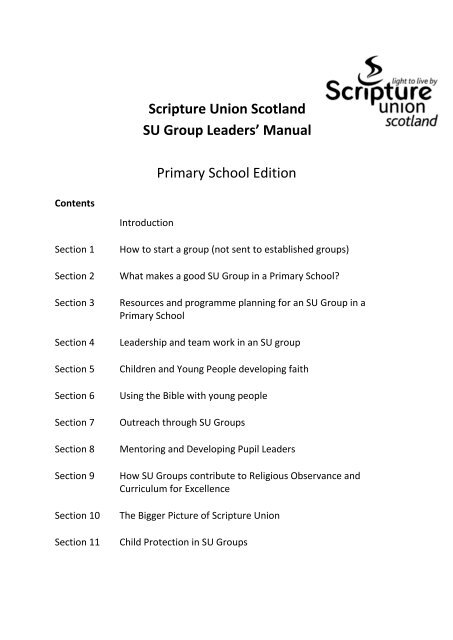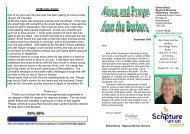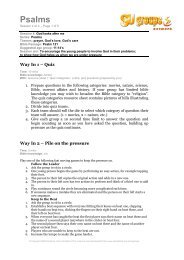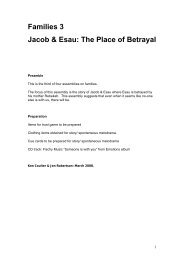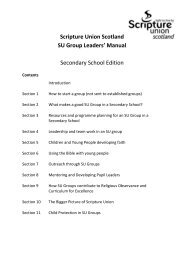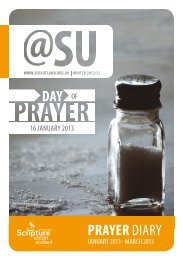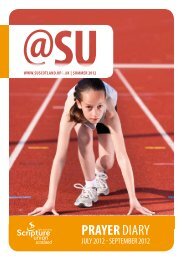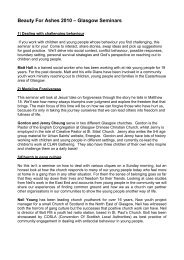How to start an SU Group - Scripture Union Scotland
How to start an SU Group - Scripture Union Scotland
How to start an SU Group - Scripture Union Scotland
You also want an ePaper? Increase the reach of your titles
YUMPU automatically turns print PDFs into web optimized ePapers that Google loves.
<strong>Scripture</strong> <strong>Union</strong> Scotl<strong>an</strong>d<strong>SU</strong> <strong>Group</strong> Leaders’ M<strong>an</strong>ualPrimary School EditionContentsIntroductionSection 1Section 2Section 3Section 4Section 5Section 6Section 7Section 8Section 9Section 10Section 11<strong>How</strong> <strong>to</strong> <strong>start</strong> a group (not sent <strong>to</strong> established groups)What makes a good <strong>SU</strong> <strong>Group</strong> in a Primary School?Resources <strong>an</strong>d programme pl<strong>an</strong>ning for <strong>an</strong> <strong>SU</strong> <strong>Group</strong> in aPrimary SchoolLeadership <strong>an</strong>d team work in <strong>an</strong> <strong>SU</strong> groupChildren <strong>an</strong>d Young People developing faithUsing the Bible with young peopleOutreach through <strong>SU</strong> <strong>Group</strong>sMen<strong>to</strong>ring <strong>an</strong>d Developing Pupil Leaders<strong>How</strong> <strong>SU</strong> <strong>Group</strong>s contribute <strong>to</strong> Religious Observ<strong>an</strong>ce <strong>an</strong>dCurriculum for ExcellenceThe Bigger Picture of <strong>Scripture</strong> <strong>Union</strong>Child Protection in <strong>SU</strong> <strong>Group</strong>s
Team Leaders’ M<strong>an</strong>ual – School <strong>SU</strong> <strong>Group</strong>sIntroductionEach school day across Scotl<strong>an</strong>d, around 1,250 pupils meet with school staff, church leaders,parents, senior pupils <strong>an</strong>d other volunteers in “<strong>Scripture</strong> <strong>Union</strong> <strong>Group</strong>s” <strong>to</strong> explore the Bible <strong>an</strong>drespond <strong>to</strong> what they read there. We w<strong>an</strong>t <strong>to</strong> th<strong>an</strong>k all of you who have recently become involvedin this work, <strong>an</strong>d all of you who have been involved in <strong>SU</strong> groups for m<strong>an</strong>y years.This Team Leaders’ M<strong>an</strong>ual has been written by the Regional Workers <strong>an</strong>d Associate Workers of <strong>SU</strong>Scotl<strong>an</strong>d <strong>to</strong> give you ideas, resources <strong>an</strong>d stimulation <strong>to</strong> make the most of your <strong>SU</strong> <strong>Group</strong> <strong>an</strong>d theopportunity it presents for children <strong>an</strong>d young people of Scotl<strong>an</strong>d <strong>to</strong> explore the Bible <strong>an</strong>d respond<strong>to</strong> the signific<strong>an</strong>ce of Jesus. There are variations in the early chapters for those working in Primary,Secondary <strong>an</strong>d Special Needs schools <strong>an</strong>d the chapter about setting up <strong>an</strong> <strong>SU</strong> <strong>Group</strong> is only provided<strong>to</strong> leaders initiating new groups –if you are really keen <strong>to</strong> see it, you c<strong>an</strong> find it on the <strong>SU</strong> Scotl<strong>an</strong>dWebsite or from your local staff member.On the subject of staff, we’ll use the phrase “local staff member” <strong>to</strong> refer <strong>to</strong> Associate Workers,Local Area Workers <strong>an</strong>d Regional Workers <strong>an</strong>d assume that you know which person you relate <strong>to</strong>directly. Similarly the “local office” may be the Regional office or the office of your local Trust that isassociated with <strong>SU</strong> Scotl<strong>an</strong>d <strong>an</strong>d employs their own staff member. Someone must have posted this<strong>to</strong> you so you should know where <strong>to</strong> contact us but if you don’t, please call our Regional Departmentin our Head Office in Glasgow on 0141 352 7631 or follow the link called “Who is my local worker?”on the front page of our website www.suscotl<strong>an</strong>d.org.ukThis m<strong>an</strong>ual is provided <strong>to</strong> the Team Leader or person who we see as responsible for the leading of<strong>an</strong> <strong>SU</strong> group. You are at liberty <strong>to</strong> make further copies of this for other members of your team if youwish as you work through the ideas contained within. The advice <strong>an</strong>d ideas contained within it arenot exclusive <strong>to</strong> “<strong>Scripture</strong> <strong>Union</strong> <strong>Group</strong>s” <strong>an</strong>d may well be helpful <strong>to</strong> those leading school groupsnot affiliated <strong>to</strong> <strong>SU</strong> Scotl<strong>an</strong>d, or <strong>to</strong> church youth groups.<strong>SU</strong> Scotl<strong>an</strong>d’s Volunteer H<strong>an</strong>dbook needs <strong>to</strong> be read in conjunction with this Team Leaders’ M<strong>an</strong>ualas it is that document which outlines our policies <strong>an</strong>d procedures for all <strong>SU</strong> activities. It also directsyou <strong>to</strong> the <strong>SU</strong> Scotl<strong>an</strong>d Emergency Contact number which m<strong>an</strong>y people only associate with HolidayActivities but is available <strong>to</strong> assist with Child Protection or other challenges for <strong>Group</strong> Leaders.We wish you God’s blessing on your work for Him <strong>an</strong>d assure you of the prayers of our staff <strong>an</strong>dcountless supporters as you undertake this frontline role with <strong>SU</strong> Scotl<strong>an</strong>d.Regional Ministries Department,<strong>SU</strong> Scotl<strong>an</strong>dJ<strong>an</strong>uary 2012J<strong>an</strong>uary 2012
Team Leaders’ M<strong>an</strong>ual – School <strong>SU</strong> <strong>Group</strong>sSection 1 <strong>How</strong> <strong>to</strong> <strong>start</strong> <strong>an</strong> <strong>SU</strong> <strong>Group</strong>This chapter is intended as a training resource, but it will help <strong>to</strong> work through at least some of thiswith <strong>Scripture</strong> <strong>Union</strong> Scotl<strong>an</strong>d (<strong>SU</strong>) or Associate Trust staff, <strong>an</strong>other experienced group leader <strong>an</strong>d allmembers of your team.The title “<strong>SU</strong> <strong>Group</strong>” is virtually the default setting for Christi<strong>an</strong> <strong>Group</strong>s in Scottish schools (just as aDyson vacuum cle<strong>an</strong>er is just as likely <strong>to</strong> be called a Hoover even though it’s a Dyson). This positionreflects the long his<strong>to</strong>ry of <strong>SU</strong>’s work in Scottish schools as well as the national breadth of our workover the years <strong>an</strong>d brings with it a trust from school staff <strong>an</strong>d church leaders as well as aresponsibility on current <strong>SU</strong> staff <strong>an</strong>d volunteers <strong>to</strong> protect the goodwill offered <strong>to</strong> us. As suchgroups c<strong>an</strong> be called “<strong>SU</strong> <strong>Group</strong>s” that we know nothing about; <strong>to</strong> protect our name <strong>an</strong>d ministrythough, we w<strong>an</strong>t <strong>to</strong> help you set up a group that builds on the good name enjoyed across Scotl<strong>an</strong>d<strong>an</strong>d maintains a recognised st<strong>an</strong>dard.This document raises a number of issues <strong>an</strong>d offers advice <strong>an</strong>d guid<strong>an</strong>ce relev<strong>an</strong>t <strong>to</strong> <strong>start</strong>ing <strong>an</strong> <strong>SU</strong><strong>Group</strong>. The subsequent questionnaire uses the same 10 subject areas, asking specific questions <strong>an</strong>dproviding space <strong>to</strong> gather information <strong>an</strong>d record your thinking as you work, with others, <strong>to</strong>establish <strong>an</strong> <strong>SU</strong> <strong>Group</strong> in school.1.1.1 ResearchGet <strong>to</strong> know your school <strong>an</strong>d some of the people in it. The ch<strong>an</strong>ces are that you have someinvolvement already as a teacher, parent, chaplain, youth worker or pupil. Find out about thecurrent Christi<strong>an</strong> work <strong>an</strong>d witness in the school then the recent his<strong>to</strong>ry <strong>an</strong>d the future interest <strong>an</strong><strong>SU</strong> <strong>Group</strong>. Use the school website <strong>to</strong> gather information that you don’t have access <strong>to</strong>. Talk <strong>to</strong>others in a similar role <strong>to</strong> you <strong>an</strong>d then <strong>start</strong> <strong>to</strong> approach others who they recommend.1.1.2 Involve other Christi<strong>an</strong>s from the Chaplaincy Team, pupils, school staff or localchurchesA team with a breadth of membership will bring different talents <strong>an</strong>d availability <strong>to</strong> strengthen theprogramme so gather <strong>to</strong>gether a workable group of volunteers. It may be that school staff c<strong>an</strong> bethere as “gatekeepers” <strong>to</strong> give school m<strong>an</strong>agement confidence but c<strong>an</strong>not offer preparation time orleadership. Be clear what people are being asked <strong>to</strong> do <strong>an</strong>d are offering <strong>to</strong> do <strong>an</strong>d be willing <strong>to</strong> pushthem.1.1.3 Pray as <strong>an</strong> individual <strong>an</strong>d with others for the school, <strong>an</strong>d for initiatives that couldbe taken <strong>to</strong> <strong>start</strong> a group in the schoolRegister with Pray For Schools (www.suscotl<strong>an</strong>d.org.uk/pray/) administered by <strong>SU</strong> Scotl<strong>an</strong>d; if othersare praying for the same school <strong>an</strong>d are happy <strong>to</strong> be put in <strong>to</strong>uch, then we’ll connect you. Thewebsite offers ideas <strong>an</strong>d resources <strong>to</strong> help you <strong>an</strong>d other people pray for your school throughout theyear as well as at two signific<strong>an</strong>t times: Back <strong>to</strong> School with God Sunday (August) <strong>an</strong>d the Europewide “Pray for Schools Day” in Oc<strong>to</strong>ber. Resources <strong>an</strong>d ideas are also available in “hard copy” fromour Prayer Co-ordina<strong>to</strong>r in the <strong>SU</strong> Scotl<strong>an</strong>d national office on 0141 332 1162.Most <strong>SU</strong> staff circulate prayer needs for their region <strong>to</strong> supporters on a regular basis; get your newsincluded by contacting your local office. Try <strong>to</strong> add news <strong>to</strong> your church prayer agenda innewsletters, prayer meetings or other services.J<strong>an</strong>uary 2012
Team Leaders’ M<strong>an</strong>ual – School <strong>SU</strong> <strong>Group</strong>s1.1.4 Think what kind of group you would like <strong>to</strong> <strong>start</strong><strong>SU</strong> groups c<strong>an</strong> take m<strong>an</strong>y forms <strong>an</strong>d styles. It may well be that the format of the group ch<strong>an</strong>ges asyou talk <strong>an</strong>d pray with others or once the group has <strong>start</strong>ed, but you’ll need <strong>to</strong> have a pl<strong>an</strong> <strong>to</strong> beginwith – at least <strong>to</strong> be able <strong>to</strong> hold <strong>an</strong> intelligent conversation with school m<strong>an</strong>agement. Some <strong>SU</strong><strong>Group</strong>s in both primary <strong>an</strong>d secondary schools have a limited age r<strong>an</strong>ge; this c<strong>an</strong> help <strong>to</strong> keep thegroup more focussed on what it does. If you are looking <strong>to</strong> develop a senior pupil group fordiscipleship <strong>an</strong>d Bible study it is likely <strong>to</strong> have a different feel from a group that seeks <strong>to</strong> gather thevarious pupils who have just come up from their primary school <strong>SU</strong> <strong>Group</strong>. The resources <strong>an</strong>dprogramme pl<strong>an</strong>ning sections of the <strong>SU</strong> <strong>Group</strong> Leaders’ M<strong>an</strong>ual will be helpful for you here.We have identified what makes a school group <strong>an</strong> “<strong>SU</strong> group” <strong>an</strong>d these values are listed below.This list is not intended <strong>to</strong> stifle creativity by group leaders, but rather <strong>to</strong> engender a common ethosthat defines the ministry of <strong>SU</strong> Scotl<strong>an</strong>d.• To deepen relationships with each other whilst learning dependence on God;• To have prayer <strong>an</strong>d Bible engagement central <strong>to</strong> the programme of meetings;• To be centred on the needs of children <strong>an</strong>d young people <strong>an</strong>d encourage their faith journey;• To strive <strong>to</strong> be inclusive <strong>to</strong> all <strong>an</strong>d create <strong>an</strong> atmosphere of Christi<strong>an</strong> love;• To have clearly-defined aims which are ev<strong>an</strong>gelistic <strong>an</strong>d discipleship oriented;• To model Christi<strong>an</strong> values <strong>an</strong>d lifestyle amongst the group;• To be fun <strong>an</strong>d relev<strong>an</strong>t for those who attend;• To be well-led by accredited <strong>SU</strong> leadersIn this m<strong>an</strong>ual we always refer <strong>to</strong> “<strong>SU</strong> <strong>Group</strong>s” but you are at liberty <strong>to</strong> call the group <strong>an</strong>ything thatdescribes, labels or defines the group <strong>to</strong> the satisfaction of you <strong>an</strong>d the school. This might be LunchBunch, Monday Club, Ignite, 2CY, The Grid, . If you are calling it <strong>an</strong> “<strong>SU</strong> <strong>Group</strong>”, or referring <strong>to</strong> it assuch with the school’s M<strong>an</strong>agement Team, then we’d w<strong>an</strong>t you <strong>to</strong> be <strong>an</strong> accredited volunteer with<strong>SU</strong> Scotl<strong>an</strong>d – more of that next.1.1.5 Work with the full knowledge of Regional Worker or Local Area Worker staff from<strong>SU</strong> Scotl<strong>an</strong>d or staff from <strong>an</strong> Associated TrustYou may well have made contact with a staff member for <strong>SU</strong> or one of our Associated Trusts bynow. If not, visit www.suscotl<strong>an</strong>d.org.uk/regional <strong>an</strong>d use the links <strong>to</strong> track down your neares<strong>to</strong>ffice. We will aim <strong>to</strong> support you in the thinking <strong>an</strong>d pl<strong>an</strong>ning <strong>to</strong>wards <strong>an</strong> <strong>SU</strong> <strong>Group</strong> as well asguiding you through the process that accredits you as a Volunteer for all aspects of <strong>SU</strong> Scotl<strong>an</strong>d’swork.• One member of your team needs <strong>to</strong> be identified as the school Team Leader <strong>an</strong>d shouldrequest Team Leader Forms (<strong>an</strong>d TL Reference forms) from your Regional or Associate Staff or LocalArea Worker (these forms are not available from the <strong>SU</strong> Scotl<strong>an</strong>d website).• Other Team Members complete Volunteer Forms – application <strong>an</strong>d two referees - which areavailable from the our staff or our website (www.suscotl<strong>an</strong>d.org.uk/volunteer <strong>an</strong>d look for the“Application Packs link”)• Please send or h<strong>an</strong>d your reference forms on <strong>to</strong> your two referees, asking them <strong>to</strong> send themon <strong>to</strong> the Volunteers Unit in Glasgow (or for you <strong>to</strong> forward for them with your application forms,J<strong>an</strong>uary 2012
Team Leaders’ M<strong>an</strong>ual – School <strong>SU</strong> <strong>Group</strong>s• The <strong>SU</strong> or Associate staff member will w<strong>an</strong>t <strong>to</strong> meet with the prospective Team Leader,normally once they receive a copy of your TL Form. This meeting will discuss subjects such as yourexperience in working with the Bible with children <strong>an</strong>d young people; leading <strong>an</strong>d working in a team;working across denominations as well as the content of your Team Leader Form• The <strong>SU</strong> Scotl<strong>an</strong>d Volunteer Unit will send you <strong>an</strong> application form for the Protection ofVulnerable <strong>Group</strong>s Scheme (formerly Disclosure). On completion of the process, they will send you aVolunteers’ H<strong>an</strong>dbook <strong>an</strong>d a welcome letter.• It may well be possible <strong>to</strong> put you in <strong>to</strong>uch with other group leaders <strong>to</strong> see groups in actionbefore you <strong>start</strong>, <strong>an</strong>d also <strong>to</strong> find ongoing support.• We will also provide you with <strong>an</strong> <strong>SU</strong> <strong>Group</strong> Leaders’ M<strong>an</strong>ual for ideas, resources advice <strong>an</strong>dpolicy documents.1.1.6 Work with the full knowledge of the School M<strong>an</strong>agement TeamHeadteachers often value a busy extra-curricular programme of clubs on offer in their schools. <strong>SU</strong>groups c<strong>an</strong> contribute <strong>to</strong> the delivery of Curriculum for Excellence in a school as pupils learn <strong>an</strong>d lead<strong>to</strong>gether. They are also unders<strong>to</strong>od <strong>to</strong> have <strong>an</strong> import<strong>an</strong>t place in Religious Observ<strong>an</strong>ce in schools:Members of the school community, including pupils, parents <strong>an</strong>d representatives of faith groups <strong>an</strong>dcommunities, may wish <strong>to</strong> have opportunities for org<strong>an</strong>ised acts of worship within the informalcurriculum of the school. Ministers would encourage headteachers <strong>to</strong> consider these requestspositively <strong>an</strong>d make suitable arr<strong>an</strong>gements if appropriate personnel <strong>an</strong>d accommodation c<strong>an</strong> beprovided.(Scottish Government letter <strong>to</strong> Direc<strong>to</strong>rs of Education & Headteachers of all schools, February 2011)Contact the school, asking <strong>to</strong> <strong>start</strong> <strong>an</strong> <strong>SU</strong> group <strong>an</strong>d requesting a meeting with the Headteacher or<strong>an</strong>other member of the Senior/School M<strong>an</strong>agement Team. Do not expect <strong>to</strong> just turn up <strong>an</strong>d speak<strong>to</strong> them unless you have a particularly good relationship already. The Scottish Government letterquoted above still leaves the decision on your group with the head teacher so don’t go in asking for“your right.” There may be reasons for “not now” such as school refurbishment. Clearly we believein the power of prayer <strong>to</strong> ch<strong>an</strong>ge people <strong>an</strong>d circumst<strong>an</strong>ces so it may be that you may have <strong>to</strong> askagain after a reasonable period of time.Head Teachers will apply <strong>an</strong>d interpret best practice in different ways in each school so be prepared<strong>to</strong> ask the questions offer on our parallel document. Don’t set out <strong>to</strong> make it difficult for pupils <strong>to</strong>come <strong>to</strong> the group but be prepared <strong>to</strong> go along with all that is asked of you by the school.Bear in mind that <strong>an</strong> <strong>SU</strong> <strong>Group</strong> is, first <strong>an</strong>d foremost, <strong>an</strong> extra-curricular club for the school so theapproval of the school is paramount <strong>an</strong>d relies on the Head teacher’s assessment of you <strong>an</strong>d of yourproposal. Prepare well for this meeting. A further implication of this is that the group is ‘governed’primarily by school policies <strong>an</strong>d secondly by <strong>SU</strong> policies. For example it will operate under theschools child protection policy which you should be sure <strong>to</strong> see, read <strong>an</strong>d be able <strong>to</strong> apply. Forexample find out who the member of senior staff is <strong>to</strong> whom you would report <strong>an</strong>y child protectionconcerns.J<strong>an</strong>uary 2012
Team Leaders’ M<strong>an</strong>ual – School <strong>SU</strong> <strong>Group</strong>sSome other questions may well come up later with the school <strong>an</strong>d these are listed in the parallelpaper.1.1.7 Make sure that you <strong>an</strong>d your leaders are properly prepared for your groupAgree in adv<strong>an</strong>ce what materials you will use. Here are some suggestions, <strong>an</strong>d there are alwaysmore in our Network News magazine, issued <strong>to</strong> <strong>SU</strong> group leaders twice a year <strong>an</strong>d available from <strong>SU</strong>& Associate staff in your area. Back copies are on our website atwww.suscotl<strong>an</strong>d.org.uk/networknews.Primary: Eyelevel books <strong>an</strong>d DVDs such as Awesome, Streetwise, Rocky Road <strong>an</strong>d Target Challengefrom <strong>SU</strong> publications; Impact or Fusion (Monarch); LIGHT Material (<strong>SU</strong> “Sunday School” material)from www.lightlive.org or <strong>SU</strong> group outlines on www.schoolslive.org ;Secondary: Resources on the www.suscotl<strong>an</strong>d.org.uk/resources page; secondary materials onwww.schoolslive.org ; <strong>SU</strong>bst<strong>an</strong>ce (<strong>SU</strong> publications) a growing series of senior secondary material;The Grid (from the <strong>SU</strong> LIGHT Material normally associated with Sunday Schools)There are also the chapters on Resources <strong>an</strong>d Pl<strong>an</strong>ning in the <strong>SU</strong> <strong>Group</strong> Leaders M<strong>an</strong>ual.You will also need <strong>to</strong> consider how prepared you are <strong>to</strong> discipline children <strong>an</strong>d young people insetting the boundaries for your group.1.1.8 Advertise your group <strong>to</strong> those whom you would like <strong>to</strong> see comingTry <strong>to</strong> generate <strong>an</strong> awareness <strong>an</strong>d <strong>an</strong>ticipation for the group <strong>start</strong>ing. In primary schools it may wellbe appropriate <strong>to</strong> send a letter home <strong>to</strong> parents (even if there is no return slip <strong>to</strong> sign off. Look onthe <strong>SU</strong> Scotl<strong>an</strong>d website <strong>an</strong>d download logos if you w<strong>an</strong>t <strong>to</strong> use them:www.suscotl<strong>an</strong>d.org.uk/about/corporate-identityBeing able <strong>to</strong> talk <strong>to</strong> people face <strong>to</strong> face will be more signific<strong>an</strong>t th<strong>an</strong> <strong>an</strong> email, notice read out inclass or poster on the wall – though these ideas c<strong>an</strong> still be used. Ask for some input <strong>to</strong> assembliesor a presence in a central area of the school at breaks. Some <strong>SU</strong> Volunteers have been instrumental<strong>to</strong> <strong>start</strong>ing a Clubs <strong>an</strong>d Societies Fair in their school where you could invite responses <strong>to</strong> shortquestionnaires. In subsequent years, group member s may help in this process as well.Consider contacting local churches <strong>an</strong>d youth groups <strong>to</strong> help the group reach a critical mass early on.1.1.9 Personally invite those who you would like <strong>to</strong> see comingPerhaps some pupils already have a connection with you or with a local church; try <strong>to</strong> getinformation <strong>to</strong> all the local churches. Perhaps some pupils have been <strong>to</strong> a <strong>Scripture</strong> <strong>Union</strong> holiday,weekend or mission. Ask your Regional Worker or Associate Trust worker for a list of these people<strong>an</strong>d work out how best <strong>to</strong> contact them.1.1.10 Persevere with your vision for the school for at least a term <strong>an</strong>d then evaluate<strong>SU</strong> <strong>Group</strong>s c<strong>an</strong> take a bit of time <strong>to</strong> get off the groups but they c<strong>an</strong> also become “the place <strong>to</strong> be” sobe prepared for either eventuality. Keep supporters informed <strong>an</strong>d praying for your group. Try <strong>to</strong>bal<strong>an</strong>ce the need for a consistency <strong>an</strong>d structure that pupils c<strong>an</strong> identify <strong>an</strong>d relate <strong>to</strong> with <strong>an</strong>expectation that there will be new <strong>an</strong>d exciting things happening at the group.Look <strong>to</strong> the rest of the <strong>SU</strong> <strong>Group</strong> Leaders’ M<strong>an</strong>ual for advice <strong>an</strong>d ideas as the group develops.J<strong>an</strong>uary 2012
Team Leaders’ M<strong>an</strong>ual – School <strong>SU</strong> <strong>Group</strong>s<strong>How</strong> <strong>to</strong> <strong>start</strong> <strong>an</strong> <strong>SU</strong> <strong>Group</strong> – Questions <strong>to</strong> <strong>an</strong>swerThis set of questions document is a checklist <strong>to</strong> work through <strong>to</strong> ensure that your group gets off <strong>to</strong>the best possible <strong>start</strong>. It will help <strong>to</strong> work through at least some of this with <strong>Scripture</strong> <strong>Union</strong>Scotl<strong>an</strong>d (<strong>SU</strong>) or Associate Trust staff, <strong>an</strong>other experienced group leader <strong>an</strong>d all members of yourteam.Guid<strong>an</strong>ce is also provided in the <strong>SU</strong> <strong>Group</strong> Leaders M<strong>an</strong>ual, “Section 1 – Setting up <strong>an</strong> <strong>SU</strong> <strong>Group</strong>”1.2.1 ResearchSchool name:Headteacher/Rec<strong>to</strong>r:____________________________________________________________________________________________________________________________School phone number: ______________________________________________________________School email:Secretary:J<strong>an</strong>i<strong>to</strong>r:__________________________________________________________________________________________________________________________________________________________________________________________Other key staff (e.g. Deputes):_____________________________________________________________________________________________________________________________1.2.2 Involve other Christi<strong>an</strong>s from the Chaplaincy Team, pupils, school staff or localchurchesA team with a breadth of membership will bring different talents <strong>an</strong>d availability <strong>to</strong> strengthen theprogramme.Chaplains:______________________________________________________________Christi<strong>an</strong> staff or pupils:______________________________________________________________Other Christi<strong>an</strong>s (e.g. parents):______________________________________________________________Likely leaders:____________________________________________________________________________________________________________________________<strong>SU</strong> or Associate Trust Staff:______________________________________________________________1.2.3 Pray as <strong>an</strong> individual <strong>an</strong>d with others for the school, <strong>an</strong>d for initiatives that could betaken <strong>to</strong> <strong>start</strong> a group in the schoolPeople <strong>to</strong> be asked <strong>to</strong> pray regularly:J<strong>an</strong>uary 2012
Team Leaders’ M<strong>an</strong>ual – School <strong>SU</strong> <strong>Group</strong>sPrayer event:1.2.4 Think what kind of group you would like <strong>to</strong> <strong>start</strong>Aim of the group:Age group:Timings:____________________________________________________________________________________________________________________________What will you call the group?______________________________________________________________Content:______________________________________________________________e.g. a “safe place” lunch club with 5-minute thought; a 30-minute mix of games, teaching, discussion,worship; a Bible study <strong>an</strong>d prayer time, Schools Alpha or SOUL/Christi<strong>an</strong>ity Explored.Day of the week? ______________________________________________________________What days do choirs happen in the school – never a good one <strong>to</strong> clash with!What venue do you have available <strong>to</strong> you?What kind of room would you like? Are there restrictions about eating for example in school rooms?1.2.5 Work with the full knowledge of Regional Worker or Local Area Worker staff from<strong>SU</strong> Scotl<strong>an</strong>d or staff from <strong>an</strong> Associated Trust <strong>an</strong>d their policiesNameOffice addressPhone numberEmailYour <strong>SU</strong> <strong>Group</strong> “Team Leader”:1.2.6 Work with the full knowledge of the School M<strong>an</strong>agement Team <strong>an</strong>d their policiesMember of staff <strong>to</strong> meet:Date of meeting:Council/school Accreditation needed?Parents permission slip needed?Child Protection briefing received:What is the dress code that is expected of you?Are you allowed <strong>to</strong> park in the school car park?J<strong>an</strong>uary 2012
Team Leaders’ M<strong>an</strong>ual – School <strong>SU</strong> <strong>Group</strong>sWhat technology is available in the school? Where is it s<strong>to</strong>red <strong>an</strong>d who looks after it?Are pupils able <strong>to</strong> take packed lunches <strong>to</strong> the room?C<strong>an</strong> you s<strong>to</strong>re resources in the school?<strong>How</strong> c<strong>an</strong> the group be publicised within the school?(See Section 1.2.8 below)1.2.7 Make sure that you <strong>an</strong>d your leaders are properly prepared for your group meetingsWhen is your <strong>start</strong> date?What material will you use?____________________________________________________________________________________________________________<strong>How</strong> will you pl<strong>an</strong> <strong>an</strong>d communicate who does what each week?Do you need <strong>an</strong>y other resources for music, crafts, games etc? <strong>How</strong> will these be paid for?What is your approach going <strong>to</strong> be <strong>to</strong> discipline? What is acceptable? What “crosses the line?”1.2.8 Advertise your group <strong>to</strong> those whom you would like <strong>to</strong> see comingAssemblies:Clubs <strong>an</strong>d Societies Fair:Launch event:Posters:School notice sheet/email:School T<strong>an</strong>noy/video boards):Local churches:J<strong>an</strong>uary 2012
Team Leaders’ M<strong>an</strong>ual – School <strong>SU</strong> <strong>Group</strong>s1.2.9 Personally invite those who you would like <strong>to</strong> see comingWho <strong>to</strong> speak <strong>to</strong> <strong>an</strong>d invite?Who is going <strong>to</strong> do it?1.2.10 Persevere with your vision for the school for at least a term <strong>an</strong>d then evaluateA couple of questions <strong>to</strong> think about:What has gone well in this launch process?What do you w<strong>an</strong>t <strong>to</strong> see happen in the school?What should you <strong>start</strong>, s<strong>to</strong>p <strong>an</strong>d continue doing <strong>to</strong> realise this?Are there other people who you need <strong>to</strong> involve?J<strong>an</strong>uary 2012
Team Leaders’ M<strong>an</strong>ual – School <strong>SU</strong> <strong>Group</strong>sSection 2What Makes a Good Primary <strong>SU</strong> <strong>Group</strong>?No two <strong>SU</strong> groups are the same, so this is not designed <strong>to</strong> be a list of instructions; rather, it is hopedthat it will give you some ideas <strong>an</strong>d inspiration of what makes a good primary <strong>SU</strong> group <strong>an</strong>d whatdistinguishes <strong>an</strong> <strong>SU</strong> <strong>Group</strong> from other clubs that may be run in a school.2.1 The Values of <strong>an</strong> <strong>SU</strong> <strong>Group</strong>If it’s <strong>an</strong> <strong>SU</strong> group you’re running then these values will need <strong>to</strong> be evident: To deepen relationships with each other whilst learning dependence on God To have prayer <strong>an</strong>d Bible engagement central <strong>to</strong> the programme of meetings To be centred on the needs of children <strong>an</strong>d young people, <strong>an</strong>d <strong>to</strong> encourage their faithjourney To strive <strong>to</strong> be inclusive <strong>to</strong> all <strong>an</strong>d create <strong>an</strong> atmosphere of Christi<strong>an</strong> love To have clearly-defined aims which are ev<strong>an</strong>gelistic <strong>an</strong>d discipleship oriented To model Christi<strong>an</strong> values <strong>an</strong>d lifestyle amongst the group To be fun <strong>an</strong>d relev<strong>an</strong>t for those who attend To be well-led by accredited <strong>SU</strong> leaders<strong>SU</strong> groups c<strong>an</strong> take m<strong>an</strong>y forms <strong>an</strong>d styles. This list of values is not intended <strong>to</strong> stifle creativity bygroup leaders, but rather <strong>to</strong> engender a common ethos that defines the ministry of <strong>SU</strong> Scotl<strong>an</strong>d.2.2 <strong>SU</strong> <strong>Group</strong>s are Bible-CentredGood <strong>SU</strong> groups should have a clear focus on Bible engagement. Children should be helped <strong>to</strong> learnthe s<strong>to</strong>ry of the Bible through looking at individual episodes <strong>to</strong> give a greater underst<strong>an</strong>ding of God<strong>an</strong>d the Christi<strong>an</strong> faith. H<strong>an</strong>dling of the Bible <strong>an</strong>d interaction with it is a vital aspect of primary <strong>SU</strong>groups.2.3 Leadership TeamHaving a good leadership team will make the whole experience of <strong>an</strong> <strong>SU</strong> group more enjoyable <strong>an</strong>drewarding for everyone involved. A team will be united <strong>an</strong>d loving <strong>to</strong>wards each other in order <strong>to</strong> be a good witness <strong>to</strong> theschool <strong>an</strong>d the children. Leaders c<strong>an</strong> be of <strong>an</strong>y age <strong>an</strong>d experience. What matters is passion <strong>an</strong>d enthusiasm <strong>to</strong>wardschildren <strong>an</strong>d their place in God’s s<strong>to</strong>ry. Leaders should be open, honest <strong>an</strong>d genuine with the children about their life <strong>an</strong>d their faithin Jesus. They should feel free <strong>to</strong> communicate the Gospel message <strong>to</strong> the children.2.4 PracticalitiesWith <strong>an</strong> <strong>SU</strong> group being run in a school, it is import<strong>an</strong>t <strong>to</strong> make <strong>an</strong> effort <strong>to</strong> maintain goodrelationships with staff <strong>an</strong>d parents, <strong>an</strong>d <strong>to</strong> see yourself as part of the wider school community. <strong>SU</strong>groups come in all different forms <strong>an</strong>d leaders should not feel restricted <strong>to</strong> a specific model. Hereare some examples of different types of <strong>SU</strong> groups: A lunchtime group in a small school for all ages <strong>an</strong>d stages An after-school club running for <strong>an</strong> hour or so alongside other clubs A short term club running in 6-8 week blocks A lunchtime group for a limited mix of agesJ<strong>an</strong>uary 2012
Team Leaders’ M<strong>an</strong>ual – School <strong>SU</strong> <strong>Group</strong>sTypically Primary <strong>SU</strong> <strong>Group</strong>s are for P5-P7 for a number of reasons, though none of these preclude awider or narrower r<strong>an</strong>ge: M<strong>an</strong>y <strong>SU</strong> <strong>Group</strong> Resources (<strong>SU</strong>PA Club, Schools Live, etc.) are written for P5-P7) The residential programme of <strong>SU</strong> Scotl<strong>an</strong>d <strong>start</strong>s at P5 Younger pupils c<strong>an</strong>not always remember what day of the week it is so forget <strong>to</strong> attend.2.5 Programme <strong>an</strong>d ResourcesAll sessions should be engaging <strong>an</strong>d fun for young people. This c<strong>an</strong> be done in a variety of ways <strong>an</strong>dleaders should be encouraged <strong>to</strong> think creatively <strong>an</strong>d use their skills <strong>an</strong>d gifts. For example: sport,crafts, music, games, s<strong>to</strong>rytelling, etc. An engaging, structured programme c<strong>an</strong> help with holding theattention of the group.Good groups are well pl<strong>an</strong>ned so that leaders know in adv<strong>an</strong>ce what they are doing. <strong>How</strong>ever don’tlet the thought of hours of endless preparation discourage you. There are m<strong>an</strong>y f<strong>an</strong>tastic resourcesavailable <strong>to</strong> help <strong>to</strong> create a good programme.2.6 SupportNobody is expected <strong>to</strong> take on <strong>an</strong> <strong>SU</strong> group by themselves. There is plenty of support available fromlocal <strong>SU</strong> staff members <strong>an</strong>d local churches. Local <strong>SU</strong> staff members are able <strong>to</strong> provide resources <strong>an</strong>d advice for running a group. Local church members/ ministers should be encouraged <strong>to</strong> pray for <strong>an</strong>d perhaps visit the <strong>SU</strong>group. Maintain links with local churches through good communication <strong>an</strong>d ensure they know whatis going on in their local school. Encourage them <strong>to</strong> register with ‘Pray for Schools Scotl<strong>an</strong>d’.2.7 AtmosphereChildren attending <strong>an</strong> <strong>SU</strong> group need <strong>to</strong> feel safe, welcome, valued <strong>an</strong>d loved.<strong>SU</strong> groups should be inclusive, <strong>an</strong>d nobody should feel left out. It should be noticeably different <strong>to</strong> aclassroom environment with <strong>an</strong> emphasis on enjoyment <strong>an</strong>d a relaxed atmosphere. Leaders shouldlearn names <strong>an</strong>d get <strong>to</strong> know the young people in their group.Leading <strong>an</strong> <strong>SU</strong> group will be a hugely rewarding experience. You might be surprised by how muchyou grow <strong>an</strong>d learn through the running of it. You may not ever see the fruit of your labour, but beassured that God will use the group for His glory.J<strong>an</strong>uary 2012
Team Leaders’ M<strong>an</strong>ual – School <strong>SU</strong> <strong>Group</strong>sSection 3 Resources <strong>an</strong>d Programming for a Primary groupIf you <strong>an</strong>d your team are going <strong>to</strong> run a good attractive programme each week for young people inthe upper end of Primary school, you’ll need <strong>to</strong> pl<strong>an</strong> ahead with a theme, <strong>an</strong>d you’ll need <strong>to</strong> thinkabout what are the main ingredients of your programme every time.The recipe must include a real effort <strong>to</strong> know the name of every individual in the group, <strong>to</strong> makethem feel welcomed, <strong>an</strong>d as most young people in the group won’t know very much about theChristi<strong>an</strong> Faith, we must represent Jesus <strong>to</strong> each one, so that when it comes <strong>to</strong> sharing the GoodNews, then they will see that it’s something you practice as well as preach!3.1 Main Ingredients Every Week at your <strong>SU</strong> <strong>Group</strong>If your group meets over lunchtime you may only have half <strong>an</strong> hour in which <strong>to</strong> meet as a group, <strong>an</strong>dif you meet after school, you may have more time. Most Primary <strong>SU</strong> groups meet at lunchtime inschools, but there are quite a few which meet at the end of the school day. There are adv<strong>an</strong>tages inboth, but whenever the group meets, the ingredients will be very similar…3.1.1 Eat <strong>to</strong>getherSome schools allow their lunchtime <strong>SU</strong> group members <strong>to</strong> be served first so that they c<strong>an</strong> get <strong>to</strong> thegroup on time, but other groups arr<strong>an</strong>ge <strong>to</strong> meet over a packed lunch, with the school’s permission.This c<strong>an</strong> be a very import<strong>an</strong>t part of the programme, allowing you <strong>an</strong>d your team <strong>to</strong> spend timegetting <strong>to</strong> know the young people in your group <strong>an</strong>d showing each one that they matter, <strong>an</strong>d areimport<strong>an</strong>t <strong>to</strong> you as individuals.Even if the group meets for <strong>an</strong> hour after school, it’s often a good idea, with school permission, <strong>to</strong>provide something <strong>to</strong> drink along with a biscuit, <strong>an</strong>d this allows some young people <strong>to</strong> takeresponsibility, <strong>an</strong>d it allows you <strong>to</strong> spend time getting <strong>to</strong> know the individuals in your group.3.1.2 Share <strong>to</strong>getherEvery member of your group will have something <strong>to</strong> say, but it’s good <strong>to</strong> allow a short time for them<strong>to</strong> tell everyone in the group their news – especially from family or community – that’s a really goodway of allowing individuals <strong>to</strong> feel valued. Jesus listened, we must listen. For some young people,apart from their teacher, you may be the only signific<strong>an</strong>t adult who might listen <strong>to</strong> what they aresaying.3.1.3 Play <strong>to</strong>getherThese are children <strong>an</strong>d they enjoy playing <strong>to</strong>gether. Games c<strong>an</strong> be just pure fun <strong>an</strong>d are of greatvalue on their own, or they c<strong>an</strong> introduce the group <strong>to</strong> some aspect of the Bible passage you areabout <strong>to</strong> look at. They don’t need a lot of space, <strong>an</strong>d very often, simple social games done in a circleon chairs c<strong>an</strong> be very popular <strong>an</strong>d there are lots of very simple ideas. Sometimes programmematerial provide some ideas <strong>to</strong> go along with the theme, but other good current resources forPrimary games include“Ultimate Games” from <strong>Scripture</strong> <strong>Union</strong>, is crammed full of creative <strong>an</strong>d imaginative ways <strong>to</strong> helpyou <strong>an</strong>d your group explore the Bible through playing games. Active games, quiet games, teamgames, individual games, games for children, games for young people - they're all here. Inside you'llfind all the instructions <strong>an</strong>d guid<strong>an</strong>ce you need <strong>to</strong> help even the most game-shy leader make theJ<strong>an</strong>uary 2012
Team Leaders’ M<strong>an</strong>ual – School <strong>SU</strong> <strong>Group</strong>smost of this fun way <strong>to</strong> explore God's Word! £9.99 <strong>an</strong>d previously sold as “Over 300 games for alloccasions. http://www.scriptureunion.org.uk/ProductFolder/UltimateGames/58740.idThis is part of a series of excellent books for leaders, <strong>an</strong>d the others include Ultimate Quizzes,Ultimate Visual Aids, Ultimate Prayer, , all at £9.99.<strong>an</strong>d Ultimate Craft (£12.99)“Everyone’s a Winner” from <strong>Scripture</strong> <strong>Union</strong>. Over 200 co-operative games for 7-13 year olds. It’s a"must have" for <strong>an</strong>yone working with this age group. This illustrated book is a radically differentapproach <strong>to</strong> games for young people that are mainly collaborative, enormous fun <strong>an</strong>d designed <strong>to</strong>build up particip<strong>an</strong>ts rather th<strong>an</strong> put them down. Games <strong>an</strong>d activities like these work alongsidesharing a gospel of love <strong>an</strong>d accept<strong>an</strong>ce. With chapters on ice-breakers, ball games, messy games,music, drama <strong>an</strong>d theme games <strong>to</strong> name but a few, there is plenty <strong>to</strong> choose from. This is a superbbook with something for everyone.http://www.scriptureunion.org.uk/ProductFolder/Everyonesawinner/9894.id3.1.4 Open the Bible <strong>to</strong>getherThis has <strong>to</strong> be the core of your meeting <strong>to</strong>gether in a <strong>Scripture</strong> <strong>Union</strong> <strong>Group</strong>, otherwise your group isjust a social group. We believe that the Bible is God’s powerful Word, <strong>an</strong>d in itself it c<strong>an</strong> tr<strong>an</strong>sformlives.The majority of children who attend Primary <strong>SU</strong> groups in Scotl<strong>an</strong>d will have had little or no contactwith the Christi<strong>an</strong> church, <strong>an</strong>d will not know <strong>an</strong>ything about the Bible, so you will have <strong>to</strong> <strong>start</strong> fromscratch. That might involve using a traditional Bible Bookcase, Timeline, etc, <strong>an</strong>d it may involve youbeing creative in getting a supply of Bibles for the group <strong>to</strong> use each week. Very often, local churchesare happy <strong>to</strong> pay for Bibles <strong>to</strong> be used in this way.You may w<strong>an</strong>t <strong>to</strong> use a particular programme from <strong>an</strong>y number of good resource books, but it ispossible <strong>to</strong> choose a gospel <strong>an</strong>d work through some of the key s<strong>to</strong>ries <strong>an</strong>d teaching of JesusSit in a circle, everyone comfortable, making sure that each has his/her own copy of theBible. They may have brought their own (preferable), but you may have provided a copyfrom your resources.Open the Bible at the selected passage, <strong>an</strong>d help young people <strong>to</strong> find the passage, usingthe contents page, or using a Bible library chart.Pray that God will speak <strong>to</strong> us from the passage we are about <strong>to</strong> read. Ask a child <strong>to</strong> pray.Expect God <strong>to</strong> speak from His Word! Explain <strong>to</strong> the group that we are here <strong>to</strong> listen <strong>to</strong> whatGod is saying <strong>to</strong> us.Read the selected passage. Some young people may volunteer <strong>to</strong> read it, or you c<strong>an</strong> read ityourself. Make sure that everyone is able <strong>to</strong> find the place before you <strong>start</strong>.Ask the group <strong>to</strong> keep their Bibles open <strong>an</strong>d then simply begin <strong>to</strong> ask these questions.1. C<strong>an</strong> someone describe what happened as if he/she were there?2. Who were the main characters involved?3. <strong>How</strong> would you feel if you were there <strong>an</strong>d why?4. What do you think is the most import<strong>an</strong>t thing that happened, <strong>an</strong>d what does it showus?5. What do we learn about what God is like?6. What might Jesus be telling you <strong>to</strong> do?7. Is there someone in this s<strong>to</strong>ry that you w<strong>an</strong>t <strong>to</strong> be like? Why?8. What’s your favourite bit? Why?J<strong>an</strong>uary 2012
Team Leaders’ M<strong>an</strong>ual – School <strong>SU</strong> <strong>Group</strong>s3.1.5 Pray <strong>to</strong>getherIt may be appropriate for you <strong>to</strong> close in prayer, or sometimes, it may be appropriate <strong>to</strong> end with atime of silence or in allowing children <strong>to</strong> participate in short open prayers, as appropriate. It isimport<strong>an</strong>t that the children are allowed <strong>to</strong> respond appropriately, <strong>an</strong>d you must always make surethat you are allowing prayer <strong>to</strong> happen in <strong>an</strong> open environment, with all the considerations theschool’s Child Protection Policy, with which you must be familiar, <strong>an</strong>d with <strong>SU</strong>’s code of conduct.Some good resource books on praying with children include…“Ultimate Creative Prayer” from <strong>Scripture</strong> <strong>Union</strong> (£9.99) is crammed full of creative <strong>an</strong>dimaginative ways <strong>to</strong> help you <strong>an</strong>d your children's group get praying. Ideas include prayers <strong>to</strong> draw<strong>an</strong>d make, prayers <strong>to</strong> shout <strong>an</strong>d sing, prayers <strong>to</strong> pray alone <strong>an</strong>d pray <strong>to</strong>gether. Inside you'll find allthe instructions <strong>an</strong>d guid<strong>an</strong>ce you need <strong>to</strong> help your group pray <strong>an</strong>d grow <strong>to</strong>gether.The material in this book was originally published as One Hundred <strong>an</strong>d One Ideas for Creative Prayers<strong>an</strong>d New Ideas for Creative Prayer. Sample pages are available on the web page below.http://www.scriptureunion.org.uk/ProductFolder/UltimateCreativePrayer/59135.id3.2 TERMLY & READY MADE PROGRAMMESThere are loads of Programme ideas for children’s groups that c<strong>an</strong> last for a school term, but thebest of them at the moment include…SCHOOLSLIVE from <strong>Scripture</strong> <strong>Union</strong> (Engl<strong>an</strong>d & Wales) Free!! – www.schoolslive.orgSchoolsLive provides Bible-based resources for Christi<strong>an</strong> groups in schools, <strong>an</strong>d puts a wealth ofactivities <strong>an</strong>d ideas for your work with children <strong>an</strong>d young people at your fingertips.SchoolsLive is designed <strong>to</strong> help you tailor the material available <strong>to</strong> the specific needs of yourgroup(s). You c<strong>an</strong>: Pl<strong>an</strong> <strong>an</strong>d m<strong>an</strong>age your group like never before! Access hundreds of activities <strong>an</strong>d ideas Search, save <strong>an</strong>d print – all from one website And so much more…Through SchoolsLive we w<strong>an</strong>t <strong>to</strong> help leaders like you <strong>to</strong> be inspired <strong>an</strong>d equipped with excellentBible-based material so that children <strong>an</strong>d young people c<strong>an</strong> meet with God. There is <strong>an</strong> outline foreach week of the school year plus access <strong>to</strong> search the archive of SchoolsLive <strong>an</strong>d LightLive activities.The sessions <strong>an</strong>d activities that appear on SchoolsLive are written by experienced schools workerswho work regularly in UK schools.<strong>SU</strong>PACLUB MATERIAL – Some Meeting Outlines for Primary <strong>SU</strong> <strong>Group</strong>s from <strong>SU</strong> Engl<strong>an</strong>d & Wales.By <strong>an</strong>d large predating the schoolslive material but downloadable as one session or series outlinesalready created as a pdf file. http://www.scriptureunion.org.uk/SupaClubs/MeetingOutlines/2916.id So, Why God? – A series based on the book So, Why God? Looking at questions children askabout God. Down Town with Mark – a series looking at the life of Jesus through the eyes of Mark (spring2008). 10 Rulz – a series on the Ten Comm<strong>an</strong>dments, based on the book 10 Rulz (autumn 2007). Seasonal <strong>an</strong>d event outlines - this page lists all outlines particularly suitable for special timesin the church or school year.J<strong>an</strong>uary 2012
Team Leaders’ M<strong>an</strong>ual – School <strong>SU</strong> <strong>Group</strong>sSection 4 Leadership <strong>an</strong>d TeamworkWhat makes a good <strong>SU</strong> group leader?Well, it’s not all about age! What is needed is a genuine love for Jesus <strong>an</strong>d for children/ youngpeople, a readiness <strong>to</strong> convey your passion for the Gospel, <strong>an</strong>d a little bit of free time.4.1 Jesus’ LeadershipHere is one of the things Jesus teaches about leadership:Jesus called them <strong>to</strong>gether <strong>an</strong>d said, “You know that those who are regarded as rulers of theGentiles lord it over them, <strong>an</strong>d their high officials exercise authority over them. Not so withyou. Instead, whoever w<strong>an</strong>ts <strong>to</strong> become great among you must be your serv<strong>an</strong>t, <strong>an</strong>dwhoever w<strong>an</strong>ts <strong>to</strong> be first must be slave of all. For even the Son of M<strong>an</strong> did not come <strong>to</strong> beserved, but <strong>to</strong> serve, <strong>an</strong>d <strong>to</strong> give his life as a r<strong>an</strong>som for m<strong>an</strong>y.”Mark 10:42 – 43Take a few moments <strong>to</strong> consider the following: What does Jesus say is import<strong>an</strong>t in becoming great? Who is the supreme serv<strong>an</strong>t? Think of leaders you know – do you see these qualities within them? Think of yourself – in what ways does your leadership reflect that of Jesus?4.2 Characteristics of good leadership <strong>an</strong>d teamwork – PERFORMWhat makes a good team? <strong>How</strong> c<strong>an</strong> the team you are part of perform so that it is effective in itswork, whichever model of <strong>SU</strong> group you are working with?This c<strong>an</strong> be summarised by the word ‘PERFORM’.PurposeIt is import<strong>an</strong>t <strong>to</strong> have clear aims for your <strong>SU</strong> <strong>Group</strong>. These may vary from group <strong>to</strong> group, e.g.some groups may be more ev<strong>an</strong>gelistic while others may be more discipleship focussed. What is the main purpose of your group? What makes it distinctive from other groups in the school?EmpowermentThrough prayer God empowers those of us involved in leading <strong>SU</strong> groups. It is the responsibilityof the leader <strong>to</strong> ensure the gifts <strong>an</strong>d abilities of everyone in the team are being used. Don’tforget that senior pupils in secondary schools could have much <strong>to</strong> contribute. Does everybody feel a sense of ownership of the group <strong>an</strong>d its decision making?(Import<strong>an</strong>t if some members work within the school community <strong>an</strong>d others come insolely for the group.) Are team members equipped with the necessary resources for their role? Is everyone in your leadership team aware of training opportunities? (e.g. <strong>SU</strong> regionaltraining events, ‘Equipped <strong>to</strong> tr<strong>an</strong>sform’, Missions Training Day, COmMISSION)J<strong>an</strong>uary 2012
Team Leaders’ M<strong>an</strong>ual – School <strong>SU</strong> <strong>Group</strong>sRelationshipsGood relationships are vital with the school <strong>to</strong> ensure that ch<strong>an</strong>nels of communication are kep<strong>to</strong>pen at all times. The same is true among the group leaders - good morale creates a positiveatmosphere <strong>an</strong>d helps encourage good relationships with the pupils. <strong>How</strong> is your group thought of in the school? <strong>How</strong> c<strong>an</strong> you build up the relationships within the team? <strong>How</strong> well do the pupils relate <strong>to</strong> one <strong>an</strong>other <strong>an</strong>d <strong>to</strong> the team?FlexibilityIt is good <strong>to</strong> have a structure pl<strong>an</strong>ned for your group, but within that, flexibility is helpful. Youc<strong>an</strong> never be sure who will come <strong>to</strong> the meeting, nor what questions they will bring with them. Is your leadership team able <strong>to</strong> adjust <strong>to</strong> new circumst<strong>an</strong>ces <strong>an</strong>d ch<strong>an</strong>ges in themembership of the group? Do the young people welcome new members <strong>to</strong> the group?Optimal Perform<strong>an</strong>cePl<strong>an</strong>ning <strong>an</strong>d preparation are crucial <strong>to</strong> enable your group <strong>to</strong> run well. Involving everyone on theteam not only ensures the workload is shared but also facilitates the training of future leaders.This should allow smooth tr<strong>an</strong>sition should <strong>an</strong>yone on the leadership team have <strong>to</strong> leave. What c<strong>an</strong> your team do <strong>to</strong> make sure it is working as effectively as possible? Does the team evaluate its work <strong>an</strong>d roles of team members on a regular basis? What pl<strong>an</strong>ning c<strong>an</strong> your team put in place <strong>to</strong> ensure the continued smooth running ofyour group?Recognition <strong>an</strong>d AppreciationIt is good when members of the team value one <strong>an</strong>other <strong>an</strong>d show appreciation for each other’scontributions, as well as valuing the young people in the group. It is even better when theschool shows appreciation for the regular commitment of the leaders <strong>an</strong>d the presence of thegroup, but this will not always be the case. <strong>How</strong> valued do team members feel for the work they do? What could you do <strong>to</strong> show your appreciation <strong>to</strong> your fellow team members? Do you take time <strong>to</strong> show the young people who come <strong>to</strong> your group how much they areappreciated?M<strong>an</strong>agementGood leadership is key in helping the team <strong>to</strong> work well <strong>to</strong>gether as well as allowing the group <strong>to</strong>flourish. Some import<strong>an</strong>t characteristics of a good leader are: commitment, reliability, beingapproachable, willingness <strong>to</strong> listen, willingness <strong>to</strong> take initiative, having a clear vision for group<strong>an</strong>d believing that prayer makes a difference. Which characteristics of leadership are strongest <strong>an</strong>d which most need developmentamong your leadership team? Are all members of your leadership team aware that <strong>SU</strong> regional <strong>an</strong>d associate staff arethere for support?Care for the flock that God has entrusted <strong>to</strong> you. Watch over it willingly, not grudgingly—not forwhat you will get out of it, but because you are eager <strong>to</strong> serve God.1 Peter 5:2, New Living Tr<strong>an</strong>slation (NLT)J<strong>an</strong>uary 2012
Team Leaders’ M<strong>an</strong>ual – School <strong>SU</strong> <strong>Group</strong>sSection 5Children <strong>an</strong>d Young people developing faithThe aims of this section are: To explore how children <strong>an</strong>d young people develop in underst<strong>an</strong>ding the Christi<strong>an</strong> faith To explore what triggers faith <strong>to</strong> grow <strong>an</strong>d how a Christi<strong>an</strong> group in schools c<strong>an</strong>encourage this growth.5.1 <strong>How</strong> do you see the state of children before God?In the Bible there are m<strong>an</strong>y different ways in which people come in<strong>to</strong> a believing faith. Over theyears as people have tried <strong>to</strong> ev<strong>an</strong>gelise children <strong>an</strong>d young people, different – <strong>an</strong>d sometimesopposing – points of view <strong>an</strong>d models have been used. Consider some of these positions listedbelow: All children <strong>start</strong> life outside the kingdom The presence of a Christi<strong>an</strong> parent establishes right st<strong>an</strong>ding before God The presence of a Christi<strong>an</strong> parent creates privilege not status All children belong <strong>to</strong> God All children will begin with God but will drift from that position unless effectiveev<strong>an</strong>gelism/ teaching occurs in their livesWhat we think about the state of the child before God will determine the methods we use inev<strong>an</strong>gelism. Considering these positions opens up the issue of how <strong>to</strong> work with integrity withchildren <strong>an</strong>d young people.5.2 Considering models of faith developmentThere are m<strong>an</strong>y ideas about how faith develops in a person. Here are two for you <strong>to</strong> consider withregard <strong>to</strong> your group.John H Westerhoff: (Will our Children have Faith?, Harrisburg, Morehouse, 2000) suggests that faithgrows in us rather like a tree going through stages <strong>an</strong>d adding rings rather th<strong>an</strong> a progression or ajourney.Experienced faith is the faith of the young child or the new Christi<strong>an</strong>. It is <strong>an</strong> experience ofGod <strong>an</strong>d of the people of God. Almost subconsciously people know about God but couldn’tarticulate this. Pre-school/ Early primaryAccepted faith is the faith of childhood where things are accepted <strong>an</strong>d believed. A strongsense of accept<strong>an</strong>ce <strong>an</strong>d belonging mark this stage.Searching faith is a stage where people are experimenting <strong>an</strong>d testing out a number ofoptions. Questioning <strong>an</strong>d doubting would be hallmarks of this stage.(This would be the stageof ‘belief’ most affirmed by our society at present where everyone is free <strong>to</strong> work out theirown thing)Integrated faith is the stage where belief is ‘mine’ not from my family of peer group. Anintegrated belief which integrates lifestyle, mind heart. Adult.Westerhoff is adam<strong>an</strong>t that people must go through the stages before adult, mature faith c<strong>an</strong> beexperienced, but you might find it more helpful <strong>to</strong> look at it presented in the following way:J<strong>an</strong>uary 2012
Team Leaders’ M<strong>an</strong>ual – School <strong>SU</strong> <strong>Group</strong>sUnlike the linear-looking original, thisdiagram suggests that, rather th<strong>an</strong> faithgrowing in us along a linear path, it movesaround these stages. Although we shouldrealise that these stages are not bound <strong>to</strong> acertain age group <strong>an</strong>d that we all probablyhave different “aspects” of our faith in a fewof these stages at <strong>an</strong>y given time, we mayrecognise some of our groups beingpredomin<strong>an</strong>tly at one stage. For example,Searching is very common in late Primaryschool, whereas before that they may bemore accepting of what a trusted relative oryouth worker says.Dr James Engel, direc<strong>to</strong>r of the Billy Graham graduate programme in communications at theWhea<strong>to</strong>n College Graduate School, has observed a model of the spiritual decision-making process,(see for example What’s Gone Wrong With The Harvest, Gr<strong>an</strong>d Rapids: Zonderv<strong>an</strong> Press, 1975) Thefollowing diagram adapted from Engel shows some broad steps that a person c<strong>an</strong> go through ontheir path of spiritual development. It also helpfully reminds us of the role of God in all this <strong>an</strong>dwhere we c<strong>an</strong> fit in <strong>to</strong>o.Role of GodRole ofChristi<strong>an</strong>sNote:This diagram is descriptive not prescriptive, <strong>an</strong>d a young person may indeed return <strong>to</strong> previous pointin the “scale.” The conversion line in this Engle scale has been deliberately blurred <strong>to</strong> represent thatit is possible for this <strong>to</strong> happen over a period of time.J<strong>an</strong>uary 2012
Team Leaders’ M<strong>an</strong>ual – School <strong>SU</strong> <strong>Group</strong>s5.3 <strong>How</strong> did you get <strong>to</strong> where you are <strong>to</strong>day?One of the best ways you c<strong>an</strong> graspthis process is by considering your ownspiritual development. The circles arelike the rings of a tree <strong>an</strong>d representstages in your life i.e.: Inner Circle: 0-5 Years Next circle: 5 – 11 (primaryschool) Next circle: 12 – 20(secondaryschool) Next circle: Adult lifeDraw or write key words on the circlesfor the following1. First awareness of God as aword, a name…2. Awareness of God as a person3. God experiences4. Draw a cross where you thinkJesus was unders<strong>to</strong>od asSaviour5. Key moments of faith growthThink about <strong>an</strong>d include1. What helped progress in faith growth?2. What fac<strong>to</strong>rs hindered growth?If the circles represent inner growth then the following c<strong>an</strong> represent outward signs of growth:J<strong>an</strong>uary 2012
Team Leaders’ M<strong>an</strong>ual – School <strong>SU</strong> <strong>Group</strong>s5.4 <strong>How</strong> does this apply <strong>to</strong> your group?For us as group leaders, we c<strong>an</strong> support young people on this path of faith development by gaugingbroadly where they are, <strong>an</strong>d putting in<strong>to</strong> practice the following:ListeningEncouragingInvitingChallengingModellingthis is a 2 way process, leaders listening <strong>to</strong> young people’s experiences of God <strong>an</strong>dyoung people listening <strong>to</strong> others e.g. guest testimonies <strong>an</strong>d news of Christi<strong>an</strong>s fromaround the worldit is import<strong>an</strong>t <strong>to</strong> ground young people’s experiences, beliefs <strong>an</strong>d responses in theword of God e.g. Samuel also heard God speak <strong>to</strong> him, but wasn’t sure it was God.we should provide opportunities for young people <strong>to</strong> question <strong>an</strong>d test their beliefs/ assumptions in a safe environment e.g. “Grill a Christi<strong>an</strong>” events.we c<strong>an</strong> also create opportunities for young people <strong>to</strong> express their faith throughmission <strong>an</strong>d service within school setting, their community <strong>an</strong>d when appropriate,abroad.it is about embodying your faith personally, being one who prays, studies the Word,reaches out in service <strong>an</strong>d mission. This c<strong>an</strong> also be at a wider <strong>SU</strong> group level <strong>to</strong>o.J<strong>an</strong>uary 2012
Team Leaders’ M<strong>an</strong>ual – School <strong>SU</strong> <strong>Group</strong>sSection 6 Using the Bible with young peopleThe aims of this section are: To help leaders assess the value of using the Bible with teenagers To affirm the import<strong>an</strong>ce of the Bible in our work To equip leaders <strong>to</strong> communicate the Bible well6.1 IntroductionThe aim of <strong>Scripture</strong> <strong>Union</strong> Scotl<strong>an</strong>d is <strong>to</strong> help young people explore the Bible <strong>an</strong>d <strong>to</strong> respond <strong>to</strong> thesignific<strong>an</strong>ce of Jesus. In everything we do under the name of <strong>SU</strong>, we aim <strong>to</strong> promote <strong>an</strong>d encourageBible use amongst children, young people <strong>an</strong>d adults. The Bible is central <strong>to</strong> what we do because webelieve that it is through His word that God reveals Himself <strong>to</strong> hum<strong>an</strong> beings.<strong>How</strong>ever, the ways we choose <strong>to</strong> use the Bible must be relev<strong>an</strong>t <strong>an</strong>d helpful <strong>to</strong> the young people inour care. <strong>How</strong> do we deal with young people who dismiss the Bible as <strong>an</strong> old boring book? Whatabout those who c<strong>an</strong>’t read well? And surely if we tell them the gospel in a relev<strong>an</strong>t way, we don’tneed <strong>to</strong> bother opening the Bible?6.2 Why is the Bible import<strong>an</strong>t?“But his delight is in the law of the Lord, <strong>an</strong>d on his law he meditates day <strong>an</strong>d night. He is likea tree pl<strong>an</strong>ted by streams of water, which yields fruit in season <strong>an</strong>d whose leaf does notwither”Psalm 1:2-3Before thinking about how <strong>to</strong> communicate the Bible with teenagers, it is helpful <strong>to</strong> consider howwe, as leaders, view the Bible. If we w<strong>an</strong>t <strong>to</strong> encourage the young people in our group <strong>to</strong> findrefreshment in God’s word, we need <strong>to</strong> be thirsty for it ourselves! Take time (by yourself or withthose you run the <strong>SU</strong> group) <strong>to</strong> look up the following passages <strong>an</strong>d reflect on what the Bible has <strong>to</strong>say about itself. The Bible is the inspired word of God (2 Timothy 3:16-17 ) The Bible is trustworthy because the Author is trustworthy (Proverbs 3:1-6; Matthew 7:24-27) Jesus is the focus of God’s revelation in the Bible (John 1:14; Colossi<strong>an</strong>s 1:15-20) The Holy Spirit helps us underst<strong>an</strong>d <strong>an</strong>d interpret the Bible (2 Corinthi<strong>an</strong>s 4:4) As we read the Bible we are tr<strong>an</strong>sformed. (Psalm 1; Jeremiah 17:7-8; Rom<strong>an</strong>s 12:2; 2Timothy 3:17; James 1:25) The Bible needs <strong>to</strong> be viewed as a whole s<strong>to</strong>ry with a variety of literary genres which need <strong>to</strong>be interpreted in their own context (John 1:1-18; 2 Timothy 3:16) We have a responsibility <strong>to</strong> teach the Bible <strong>to</strong> the next generation, or perhaps morehelpfully, <strong>to</strong> help them discover its truth for themselves (Psalm 78:1-8)There is no doubt that sometimes there c<strong>an</strong> be a real battle <strong>to</strong> give the Bible space <strong>an</strong>d <strong>to</strong> let itspeak…it gets squeezed! Do you recognise these…1. Pressure <strong>to</strong> do something 'Fun' instead of Bible – <strong>to</strong> keep playing the introduc<strong>to</strong>ry game2. Having the Bible marginalised <strong>to</strong> a ‘God Slot’ – this sends out a signal that the listening <strong>to</strong> Godis not really central at all3. Distractions – lunch queues, prefect or P7 duties, or just individuals not settling; these arecommon problems (it's not just you!).J<strong>an</strong>uary 2012
Team Leaders’ M<strong>an</strong>ual – School <strong>SU</strong> <strong>Group</strong>sWill the Bible being opened <strong>an</strong>d heard from be the distinctive thing about your group? There isthe need <strong>to</strong> be very deliberate in making sure that engaging with the Bible won’t get squeezed outby other things.6.3 Top Tips for <strong>an</strong> <strong>SU</strong> group focussed on hearing from God's WordAs you look through these discuss the real, practical ways that you could see them being playedout in your group.1. 'Wow Fac<strong>to</strong>r'Show you are enthusiastic. As you introduce the programme for the day make sure youenthuse about the Bible passage or the text you are going <strong>to</strong> be looking at. ‘Today, we arelooking at <strong>an</strong> amazing passage about Moses’, ‘We are going <strong>to</strong> look at a song from the Biblelater – don’t worry I won’t sing it – but I actually think it could be life ch<strong>an</strong>ging if we listenproperly’; ‘Our s<strong>to</strong>ry <strong>to</strong>day is about one m<strong>an</strong> who was the odd one out – we are going <strong>to</strong> findout why <strong>an</strong>d then you c<strong>an</strong> decide if you would be the odd one out?’2. Tell your own s<strong>to</strong>riesAs you talk about the Bible tell what it me<strong>an</strong>s <strong>to</strong> you, how you have been ch<strong>an</strong>ged,challenged, impressed, thrown by the s<strong>to</strong>ry <strong>to</strong>o. Your own experience of the reading theBible is <strong>an</strong> import<strong>an</strong>t lesson for the young people <strong>to</strong>o.3. Let people know what’s happeningWe w<strong>an</strong>t <strong>to</strong> avoid the ‘squeeze’ on using the Bible - we know this is a d<strong>an</strong>ger, so have yourtime <strong>to</strong>gether well pl<strong>an</strong>ned so you c<strong>an</strong> say, ‘we are <strong>start</strong>ing the group in two minutes – if youneed <strong>to</strong> go <strong>to</strong> the <strong>to</strong>ilet, now is the time’ (Hopefully, just for the primary groups this one!).‘Two more rounds of this game <strong>an</strong>d then we need <strong>to</strong> open the Bible – we don’t w<strong>an</strong>t <strong>to</strong> missout on the s<strong>to</strong>ry we have <strong>to</strong>day – it’s a shocker/tear jerker/amazing, etc.’4. ‘Show me the Bible!’It’s always good <strong>to</strong> have the Bible up front, <strong>an</strong>d <strong>to</strong> keep emphasizing that they could go <strong>an</strong>dread this for themselves. Sometimes you will w<strong>an</strong>t <strong>to</strong> read it out, or perhaps learn the s<strong>to</strong>rywell <strong>an</strong>d tell in your own words but quote from time <strong>to</strong> time.You may w<strong>an</strong>t <strong>to</strong> have the passage printed on <strong>to</strong> a sheet for people <strong>to</strong> have in their h<strong>an</strong>ds,but still having the Bible h<strong>an</strong>dy is a good message for everyone.5. Homework!Often when a group doesn’t seem <strong>to</strong> go well or we haven’t seemed <strong>to</strong> get <strong>to</strong> the point wec<strong>an</strong> trace it back <strong>to</strong> preparation (lack of!). Even with good resources there is no substitutefor reading the passage until we know it well <strong>an</strong>d asking God for help <strong>to</strong> best grasp what Heis saying <strong>to</strong> us. There may be other preparation <strong>to</strong> do with games, crafts <strong>an</strong>d a whole host ofother things but don’t let your responsibility here be sidelined.6. Big S<strong>to</strong>ryIt’s always worth letting the young people know where <strong>an</strong>y given s<strong>to</strong>ry fits in <strong>to</strong> God's bigs<strong>to</strong>ry of the Bible, ie is it Old or New Testament. Have a Bible timeline – you don’t need itevery week but definitely every so often.7. Have a point!Often having one point that you w<strong>an</strong>t everyone <strong>to</strong> go away with will help you keep focused.Let them know what that point is more th<strong>an</strong> once.J<strong>an</strong>uary 2012
Team Leaders’ M<strong>an</strong>ual – School <strong>SU</strong> <strong>Group</strong>s8. Question Time!Give opportunities <strong>to</strong> a ask questions (<strong>an</strong>d get ready for the tricky ones) Sometimesquestions come out during a s<strong>to</strong>ry – look out for red herrings – <strong>an</strong>d it’s okay <strong>to</strong> say, ‘That’s agood question, <strong>an</strong>d we will look at that soon but for just now…’Having a week just for questions (with a question box available for a couple of weeksbeforeh<strong>an</strong>d). If you don’t know the <strong>an</strong>swer be honest <strong>an</strong>d say that you will get back <strong>to</strong> them.9. Re inventing the wheelThere is lots of good material around– there are some noted in Section 3. But make sure yougive yourself time <strong>to</strong> know the text more <strong>an</strong>ything.10. Make room for God <strong>to</strong> speakGive room for reflecting <strong>an</strong>d responding. Be quite deliberate about saying that there is going<strong>to</strong> be a quiet moment – or by suggesting scenarios in their own lives where they could applyGod’s word <strong>to</strong>o. i.e. if you are looking at the hard time Jeremiah got for telling God’smessage ask them <strong>to</strong> think of a time when speaking about Jesus was difficult for them, or ifthey think that speaking about their faith is the way <strong>to</strong> make themselves cool in the school.11. 'Hide the word'Have a memory verse or summary statement for the day. There are lots of fun ways <strong>to</strong> teachthis <strong>to</strong>o. Think about the purpose of teaching a memory verse. It’s not <strong>to</strong> see who thecleverest person is – it’s a ch<strong>an</strong>ce <strong>to</strong> let as m<strong>an</strong>y as possible learn it.12. Pray!Ask God <strong>to</strong> prepare the hearts of the young people <strong>an</strong>d <strong>to</strong> guide you as you prepare. AllowHim <strong>to</strong> speak <strong>to</strong> you through your preparation.6.4 <strong>How</strong> will they hear?Often the biggest frustration at <strong>an</strong> <strong>SU</strong> group is that the Bible s<strong>to</strong>ry got lost somewhere in the muddleof everything else.Think carefully about how God’s Word c<strong>an</strong> be at the centre of the group. Perhaps the game playedat the <strong>start</strong> will be helping with that. Actually, just mentioning it as people come in<strong>to</strong> the room is <strong>an</strong>obvious way <strong>to</strong> set the scene for what this group is about. (‘Hi, come in...once people have had lunchwe are looking at a brilli<strong>an</strong>t s<strong>to</strong>ry – it’s about the least likely person you would ever imaginefollowing Jesus...no, it’s not your teacher.’ Etc.)Give the s<strong>to</strong>ry prominence. <strong>How</strong> is it going <strong>to</strong> be heard?Are the young people going <strong>to</strong> read it? Then make it as easy as possible for young people <strong>to</strong> read thepassage for themselves. Some of your group may be very poor readers. Don’t ever force them <strong>to</strong>read out loud – if you are going <strong>to</strong> let people read aloud, ask for volunteers. Don’t always read thepassage – you may w<strong>an</strong>t <strong>to</strong> act it out, tell it as a s<strong>to</strong>ry, show a clip from a video like The MiracleMaker or the Jesus video or use pictures. Your group may not be able <strong>to</strong> find their way around theBible – help them by giving page numbers <strong>an</strong>d explaining the layout of the Bible.The Schools Live website has lots of good ways of telling the s<strong>to</strong>ry in interesting <strong>an</strong>d creative ways.<strong>How</strong>ever, just settling people down <strong>an</strong>d telling the s<strong>to</strong>ry in a way which shows that you know it,have loved it, w<strong>an</strong>t them <strong>to</strong> get something from it is key no matter what prop, costume, Bibleversion, etc., you are using.J<strong>an</strong>uary 2012
Team Leaders’ M<strong>an</strong>ual – School <strong>SU</strong> <strong>Group</strong>sTry <strong>to</strong> obtain a set of Bibles in a modern tr<strong>an</strong>slation for use in the group. New Living Tr<strong>an</strong>slation(NLT), Contemporary English Version (CEV) or New Century Version (NCV – Youth Bible) are all good.Failing this use www.Biblegateway.com <strong>to</strong> compare <strong>an</strong>d print Bible passages in various tr<strong>an</strong>slations.J<strong>an</strong>uary 2012
Team Leaders’ M<strong>an</strong>ual – School <strong>SU</strong> <strong>Group</strong>sSection 7 Outreach through <strong>SU</strong> <strong>Group</strong>s<strong>SU</strong> <strong>Group</strong>s as well as being the main focus of Christi<strong>an</strong> discipleship in school c<strong>an</strong> also provideme<strong>an</strong>ingful opportunities for outreach <strong>to</strong> staff <strong>an</strong>d pupils. Listed below are a variety of outreachideas for your group <strong>to</strong> try. Not every activity will be relev<strong>an</strong>t <strong>to</strong> your school or may need adaptingbut they have all been successfully tried in schools throughout Scotl<strong>an</strong>d.7.1 PrayerPrayer is vital <strong>to</strong> the success of <strong>an</strong>y <strong>SU</strong> group <strong>an</strong>d should be the first thing <strong>to</strong> embark upon whenconsidering outreach activities. Prayer possibilities might include praying with your group <strong>an</strong>d localchurches. <strong>SU</strong> regional or associate staff c<strong>an</strong> also inform you about <strong>an</strong>y relev<strong>an</strong>t prayer groups in yourarea, including Pray for Schools Scotl<strong>an</strong>d at www.suscotl<strong>an</strong>d.org.uk/pray. You may w<strong>an</strong>t <strong>to</strong> org<strong>an</strong>isea time <strong>to</strong> pray for staff <strong>an</strong>d pupils in the school leading up <strong>to</strong> the <strong>start</strong> of <strong>an</strong>y outreach events.7.2 AdvertisingIt is hard <strong>to</strong> get pupils <strong>to</strong> come along <strong>to</strong> <strong>an</strong> <strong>SU</strong> <strong>Group</strong> if they don’t know what it is. The letters “<strong>SU</strong>” oreven “<strong>Scripture</strong> <strong>Union</strong>” will not me<strong>an</strong> much <strong>to</strong> pupils who have had no prior involvement, so it isimport<strong>an</strong>t that you consider inviting pupils by me<strong>an</strong>s of personal invitation or general advertisingwith a clear expl<strong>an</strong>ation of what the group is about. School assemblies <strong>an</strong>d bulletins as well asposters are a good way <strong>to</strong> do this. Templates for postcards <strong>an</strong>d posters are available in most desk<strong>to</strong>ppublishing packages including Microsoft Publisher. <strong>SU</strong> Scotl<strong>an</strong>d Logos are available <strong>to</strong> downloadfrom http://www.suscotl<strong>an</strong>d.org.uk/about/corporate-identity.aspxRemember <strong>to</strong> get permission from the school before doing <strong>an</strong>y advertising.7.3 Youth Christi<strong>an</strong>ity Explored <strong>an</strong>d Youth AlphaThe youth material of Christi<strong>an</strong>ity Explored is called “CY”. The course explores Mark's Gospel <strong>to</strong>examine who Jesus is, why he came, <strong>an</strong>d what it me<strong>an</strong>s <strong>to</strong> follow him, <strong>an</strong>d in doing so discover thewonder of his grace. The new second edition, released in 2010, aims <strong>to</strong> present the gospel clearly <strong>to</strong>older teens, <strong>an</strong>d works with the new Soul DVD which is a seven-episode series exploring the identity,mission <strong>an</strong>d call of Jesus. Visit www.ceministries.org for more details <strong>an</strong>d <strong>to</strong> view the Soul trailer, orphone Christi<strong>an</strong>ity Explored Ministries on 0207 5808954.Youth Alpha is <strong>an</strong> ev<strong>an</strong>gelistic course that is being used by groups all around the world <strong>to</strong> help youngpeople meet Jesus. Over 8, 9 or 10 weeks the course looks at <strong>to</strong>pics from ‘Who is Jesus?’ <strong>an</strong>d ‘Whydid Jesus die?’ <strong>to</strong> ‘<strong>How</strong> & why should I read the Bible?’ It’s a more informal version of the Alphacourse using the same teaching content but adapted in a way <strong>to</strong> better engage with teenagers. Thecourse normally runs over ten weeks, plus a weekend or day away in the middle. Youth Alpha sharesthe same import<strong>an</strong>t elements as <strong>an</strong>y Alpha course – food, worship, a talk, <strong>an</strong>d small groups (exceptwith a lot more fun <strong>an</strong>d m<strong>an</strong>y more games!).It's easy <strong>to</strong> run, with a revised <strong>an</strong>d updated LEADERS' GUIDE that has all the talks written for you.Each talk has several teaching points, <strong>an</strong>d each teaching point has lots of different options forillustrating those points – including interactive games, movie clips, YouTube clips <strong>an</strong>d much more.(Please note there is no DVD set for Youth Alpha, <strong>an</strong>d film clips are not provided for copyrightJ<strong>an</strong>uary 2012
Team Leaders’ M<strong>an</strong>ual – School <strong>SU</strong> <strong>Group</strong>sreasons. There is lots of other media provided for you online.) For more information about runningYouth Alpha in your school feel free <strong>to</strong> contact lesley.smith@alpha.org at Alpha Scotl<strong>an</strong>d7.4 Big Half-Hour lunch-time events for the whole schoolWhy not consider org<strong>an</strong>ising a half-hour lunch-time event in a very public place in school? The eventcould include music, drama, guest artists, ‘grill a Christi<strong>an</strong>’ question p<strong>an</strong>el, etc.7.5 Charity fund-raising eventsFund-raising c<strong>an</strong> be a very fruitful activity <strong>an</strong>d a good way <strong>to</strong> focus your group on a specific taskwhilst developing a sense of team spirit within the group <strong>an</strong>d raising the profile of the group. <strong>SU</strong>groups have already been involved in raising money for causes as varied as flood victims in Pakist<strong>an</strong>,or <strong>to</strong> raising the profile of the Blythswood Shoe Box Appeal. One secondary school group made <strong>an</strong>dsold “P<strong>an</strong>cakes for Pakist<strong>an</strong>” at interval time <strong>to</strong> a hungry mass of peers <strong>an</strong>d staff.7.6 Leading a school assemblyM<strong>an</strong>y primary schools hold regular weekly assemblies <strong>an</strong>d it is quite usual for pupils <strong>to</strong> be involved inleading part or all of the assembly. (Assemblies in secondary schools happen less frequently th<strong>an</strong> inprimaries, but pupil involvement would usually be very welcome.) <strong>SU</strong> groups very often take a turnin leading <strong>an</strong> assembly by way of telling or performing a particular Bible s<strong>to</strong>ry or perhaps by raisingawareness of a Christi<strong>an</strong> charity at work in a relev<strong>an</strong>t part of the world e.g. TEAR fund in Africa. Itwould be best <strong>to</strong> speak with the appropriate member of the school m<strong>an</strong>agement team some time inadv<strong>an</strong>ce of such <strong>an</strong> event as schools often make up their assembly calendar well in adv<strong>an</strong>ce for theterm or indeed the year.7.7 Social eventsSometimes it is good for <strong>an</strong> <strong>SU</strong> group <strong>to</strong> org<strong>an</strong>ise <strong>an</strong> event for nothing more th<strong>an</strong> a bit of fun fortheir fellow pupils <strong>an</strong>d staff, though such events often work better when linked in<strong>to</strong> National Charitydays such as Red Nose Day or other non-uniform days. The focus should be on fun <strong>an</strong>d on pl<strong>an</strong>ningsomething me<strong>an</strong>ingful <strong>an</strong>d memorable for the school community. Primary <strong>SU</strong> groups have beenknown <strong>to</strong> help in the org<strong>an</strong>ising of summer school fetes.7.8 Christi<strong>an</strong> Focus Days/WeeksA Christi<strong>an</strong> Focus Day/Week is a programme offered <strong>to</strong> primary <strong>an</strong>d secondary schools thatcontributes <strong>to</strong> the school curriculum in a number of ways including Religious Observ<strong>an</strong>ce, Religious<strong>an</strong>d Moral Education or Personal <strong>an</strong>d Social Development. These events very often involve the localchurches working in partnership with <strong>SU</strong> staff in <strong>an</strong> area <strong>to</strong> carry out a well-pl<strong>an</strong>ned programme ofclassroom <strong>an</strong>d whole-school activities. The <strong>Scripture</strong> <strong>Union</strong> group in a school c<strong>an</strong> be a pivotalinstrument in assisting with the promoting of these programmes, <strong>an</strong>d a vital part of providing a placefor follow up for those w<strong>an</strong>ting <strong>to</strong> know more after the event. See the <strong>SU</strong> Scotl<strong>an</strong>d website for moreinformation about Christi<strong>an</strong> Focus Weeks in schools.7.9 Serving the school communityThere are m<strong>an</strong>y ways that <strong>an</strong> <strong>SU</strong> group c<strong>an</strong> serve the school community. Some <strong>SU</strong> groups have beeninvolved in litter picks for a whole term <strong>an</strong>d others have offered <strong>to</strong> wash staff cars. It’s not so muchJ<strong>an</strong>uary 2012
Team Leaders’ M<strong>an</strong>ual – School <strong>SU</strong> <strong>Group</strong>sthe activity that your group decides <strong>to</strong> do that matters, it’s the m<strong>an</strong>ner in which they carry it out <strong>to</strong>reflect something of God’s love <strong>an</strong>d care for hum<strong>an</strong>ity. Projects such as these encourage pupils <strong>to</strong>be “effective contribu<strong>to</strong>rs “<strong>an</strong>d “responsible citizens” which are two of the four capacities whichencapsulate the purpose of Curriculum for Excellence. (See Section 9)7.10 <strong>SU</strong> Residential Holidays<strong>Scripture</strong> <strong>Union</strong> groups c<strong>an</strong> take a major lead in advertising <strong>SU</strong> Residential Holidays, either by wordof mouth recommendation or by speaking at classroom or year group assemblies. This c<strong>an</strong> be donein conjunction with your local staff member who would welcome <strong>an</strong> opportunity <strong>to</strong> come in<strong>to</strong> school<strong>an</strong>d support individuals or groups with this very import<strong>an</strong>t task. Young people very often listen muchbetter <strong>to</strong> their peers <strong>an</strong>d relate better <strong>to</strong> the experience of a known individual rather th<strong>an</strong> <strong>an</strong>outsider. Your local staff member c<strong>an</strong> also provide you with resources such as brochures, postcards<strong>an</strong>d promotional presentations <strong>to</strong> increase the effectiveness of your promotion in school. Please alsosee the <strong>SU</strong> Holidays website for more information www.suholidays.org.uk7.11 QuestionsBefore doing <strong>an</strong>y outreach event, it is essential <strong>to</strong> ask yourself <strong>an</strong>d your team a few questions.1. <strong>How</strong> c<strong>an</strong> you prepare your current <strong>SU</strong> group members for outreach?2. Who are your key contacts inside <strong>an</strong>d outside of school who could be asked <strong>to</strong> train orassist?3. To what extent does this verse define how you do outreach in your school?“And if you are asked about your Christi<strong>an</strong> hope, always be ready <strong>to</strong> explain it. But you must dothis in a gentle <strong>an</strong>d respectful way.”1 Peter3:15b-16, New Living Tr<strong>an</strong>slation (NLT)J<strong>an</strong>uary 2012
Team Leaders’ M<strong>an</strong>ual – School <strong>SU</strong> <strong>Group</strong>sSection 8 Men<strong>to</strong>ring <strong>an</strong>d Developing Pupil Leaders8.1 IntroductionIn running <strong>an</strong> <strong>SU</strong> group we will often look out for others <strong>to</strong> join the team of leaders. In a secondary<strong>SU</strong> group this might be pupils <strong>an</strong>d in a primary <strong>SU</strong> group we might be aware of senior pupils locallywho could come <strong>an</strong>d be a part of the work.We must remember at the outset that it is <strong>an</strong> exciting privilege <strong>to</strong> be involved in the life of a youngperson when we c<strong>an</strong> be used by God in their men<strong>to</strong>ring <strong>an</strong>d discipleship.8.2 More th<strong>an</strong> Finding a Leader…Growing pupil leaders is something that will require <strong>an</strong> investment of time but it need not be hours<strong>an</strong>d hours out of our week. What will make the difference is when we have <strong>an</strong> interest in the youngperson as <strong>an</strong> individual <strong>an</strong>d as a Christi<strong>an</strong> who is in the process of underst<strong>an</strong>ding more about theirfaith <strong>an</strong>d how it is lived out amongst their family <strong>an</strong>d peers.It is right that we help the pupils develop their skills in area like leading a quiz or giving a short talkfrom the Bible but we should not overlook their Christi<strong>an</strong> character <strong>an</strong>d walk with God. This couldme<strong>an</strong>, where appropriate, spending time over a coffee exploring areas such as:Where are the places that they are in fellowship with other Christi<strong>an</strong>s?What are they reading in the Bible at the moment?What are they praying about <strong>an</strong>d where have they seen prayer being <strong>an</strong>swered?<strong>How</strong> are they living out their Christi<strong>an</strong> life in situations away from the <strong>SU</strong> group <strong>an</strong>d church?Take time <strong>to</strong> talk <strong>to</strong> your church leader / youth worker or staff member about how you mightdevelop this. <strong>SU</strong> Scotl<strong>an</strong>d’s COmMISSION programme has training <strong>an</strong>d discipleship events for S4-6pupils throughout the year. These events not only equip pupils but also help them <strong>to</strong> meet otherpupils in the same situation as them.Key Question – What is more import<strong>an</strong>t <strong>to</strong> you… getting someone <strong>to</strong> do jobs in the group or takingthe time <strong>to</strong> help a young Christi<strong>an</strong> grow in their faith?8.3 Identifying Pupil LeadersWho might be the young people you could men<strong>to</strong>r as pupil leaders? You are not looking for youngpeople who are ‘finished articles’. Instead you should be on the lookout for those who showevidence of Christi<strong>an</strong> faith, a love for Christ <strong>an</strong>d gifts <strong>an</strong>d skills, even if they have yet <strong>to</strong> recognisethese themselves.Growing young leaders does not happen overnight – it is <strong>an</strong> on-going project. Young leaders mightbe grown from those currently in your group or perhaps there are others who have yet <strong>to</strong> identifywith the group that you could purposely invite.8.4 Helping Pupil Leaders8.4.1 Getting StartedIt is import<strong>an</strong>t <strong>to</strong> chat through with the pupil why you are asking them <strong>to</strong> formally be a part of therunning of the group. This could include:J<strong>an</strong>uary 2012
Team Leaders’ M<strong>an</strong>ual – School <strong>SU</strong> <strong>Group</strong>sThe gifts <strong>an</strong>d experiences the pupil has – where do they feel gifted <strong>an</strong>d what have yourecognised in them, even in a small way?They will have your support <strong>an</strong>d encouragementThe opportunity that they have <strong>to</strong> positively influence other members of the group by theirexampleBeing given responsibilities that it is import<strong>an</strong>t they take seriously8.4.2 Pl<strong>an</strong>ningTalk <strong>to</strong>gether about the overall vision for the group <strong>an</strong>d how this is going <strong>to</strong> be worked out for theterm / year. This will me<strong>an</strong> doing pl<strong>an</strong>ning ahead of time <strong>an</strong>d not leaving it <strong>to</strong> the night before! It isimport<strong>an</strong>t that we model good leadership <strong>an</strong>d this includes pl<strong>an</strong>ning.What does good pl<strong>an</strong>ning look like? Knowing the programme from week <strong>to</strong> week Knowing the different elements in each week’s programme? (e.g. game, quiz, Bible talk) Specific task(s) being delegated <strong>to</strong> the pupil Your expectations of the task(s) including resources <strong>an</strong>d time available The pupil underst<strong>an</strong>ds what is being asked of them Checking if there is a need for some training for this task (e.g. if they are going <strong>to</strong> share theirtestimony how do they speak clearly <strong>an</strong>d what is it appropriate <strong>to</strong> include?) Your availability if they need <strong>to</strong> come back <strong>to</strong> you about the task(s) Make sure that you don’t throw your young people in at the deep end without a life belt!Key Question – Does the way you pl<strong>an</strong> the <strong>SU</strong> group help or hinder the pupil in what you areasking them <strong>to</strong> do?8.4.3 FeedbackAfter the task(s) has been carried out, take time <strong>to</strong> give constructive feedback <strong>to</strong> the pupil. A goodmodel for this c<strong>an</strong> be two things that went well <strong>an</strong>d one thing <strong>to</strong> improve on next time. It isimport<strong>an</strong>t <strong>to</strong> make sure that the pupil is encouraged but also that they are helped <strong>to</strong> develop theirskills.Is there a place that the pupil could also use this developing skill? (e.g. church youth group)Key Question – When have you experienced good feedback that has helped you grow in your skills<strong>an</strong>d be encouraged?8.5 ConclusionIt is import<strong>an</strong>t <strong>to</strong> remember that as we encourage pupil leaders in their on-going <strong>an</strong>d long termdiscipleship, we also need <strong>to</strong> be intentional about our own on-going <strong>an</strong>d long term discipleship. Weneed <strong>to</strong> keep on being learners as well.Key Question – In what ways are you being intentional about your own on-going discipleship?J<strong>an</strong>uary 2012
Team Leaders’ M<strong>an</strong>ual – School <strong>SU</strong> <strong>Group</strong>sSection 9<strong>How</strong> do <strong>SU</strong> <strong>Group</strong>s contribute <strong>to</strong> ReligiousObserv<strong>an</strong>ce <strong>an</strong>d Curriculum for Excellence?9.1 The Validity of <strong>SU</strong> <strong>Group</strong>s<strong>SU</strong> groups are positively encouraged within the informal curriculum.The current letter of Guid<strong>an</strong>ce from The Scottish Government issued February 2011 by LauraStewart statesMembers of the school community, including pupils, parents <strong>an</strong>d representatives of faithgroups <strong>an</strong>d communities, may wish <strong>to</strong> have opportunities for org<strong>an</strong>ised acts of worshipwithin the informal curriculum of the school. Ministers would encourage headteachers <strong>to</strong>consider these requests positively <strong>an</strong>d make suitable arr<strong>an</strong>gements if appropriate supportarr<strong>an</strong>gements c<strong>an</strong> be provided. Para 21http://www.ltscotl<strong>an</strong>d.org.uk/Images/roletter_tcm4-650445.pdf9.2 <strong>Group</strong> contribution <strong>to</strong> Religious Observ<strong>an</strong>ce (RO)Religious Observ<strong>an</strong>ce is a legal requirement for all schools under the Education (Scotl<strong>an</strong>d) Act 1980.<strong>SU</strong> groups could positively support schools in the delivery of this statu<strong>to</strong>ry duty.<strong>SU</strong> groups could contribute <strong>to</strong> RO, by leading, preparing or sharing in assemblies <strong>an</strong>d being aresource for RO events with the agreement of the Headteacher <strong>an</strong>d the RO group within the school.For a full underst<strong>an</strong>ding of the RO requirements attention is drawn <strong>to</strong> <strong>an</strong>d support c<strong>an</strong> be foundfrom: RORG report (May 2004)http://www.scotl<strong>an</strong>d.gov.uk/Publications/2004/05/19351/37062 Circular 1/2005 (Feb 2005)http://www.scotl<strong>an</strong>d.gov.uk/Resource/Doc/37428/0023554.pdfRO letter of guid<strong>an</strong>ce (Feb 2011) http://www.ltscotl<strong>an</strong>d.org.uk/Images/roletter_tcm4-650445.pdfYour local <strong>SU</strong> staff memberExamples are: Acting out plays or sketches at assembliesSharing what has been learned in <strong>an</strong> <strong>SU</strong> group or at residential event in <strong>an</strong> assemblyLinking with a local charity for distribution of foodstuffs collected at a harvest assemblyAssisting in presentation <strong>an</strong>d delivery of shoebox appeals9.3 <strong>Group</strong> <strong>an</strong>d Leader contribution <strong>to</strong> RMEReligious <strong>an</strong>d Moral Education (RME) is a statu<strong>to</strong>ry requirement under the Education (Scotl<strong>an</strong>d) Act1980. The difference between this <strong>an</strong>d RO should be unders<strong>to</strong>od. The letter of guid<strong>an</strong>ce of February2011 contains the current advice <strong>an</strong>d c<strong>an</strong> be found at:http://www.ltscotl<strong>an</strong>d.org.uk/Images/rmerercletter_tcm4-650439.pdfJ<strong>an</strong>uary 2012
Team Leaders’ M<strong>an</strong>ual – School <strong>SU</strong> <strong>Group</strong>sWithin Curriculum for Excellence (CfE) “experience <strong>an</strong>d outcomes”, RME includes curriculum areason Christi<strong>an</strong>ity <strong>an</strong>d the Development of Belief <strong>an</strong>d Values. This latter category replaces what waspreviously called “personal search”. The opportunities for <strong>SU</strong> groups <strong>an</strong>d leaders <strong>to</strong> contribute <strong>to</strong>this may be limited. <strong>How</strong>ever, where, for example, the curriculum area requires the authentic voiceof a Christi<strong>an</strong>, a contribution c<strong>an</strong> be given; or, where pupils need support in development of theirbelief <strong>an</strong>d values, then a valid opportunity exists. These occasional opportunities might have <strong>to</strong> besought <strong>an</strong>d availability indicated. This is for those who feel able <strong>to</strong> do this <strong>an</strong>d remember, your localstaff member is there <strong>to</strong> help you.9.4 <strong>SU</strong> Scotl<strong>an</strong>d’s COmMISSION ProgrammeThe development of senior pupils <strong>to</strong> take responsibility in Mission is at the heart of theCOmMISSION programme. The training provided makes huge contributions <strong>to</strong> the delivery ofCurriculum for Excellence <strong>an</strong>t this has been recognised by individual schools as well as nationally.Look at the “information for schools” section on the COmMISSION pages of the <strong>SU</strong> Scotl<strong>an</strong>d websitefor a copy of the <strong>SU</strong> Scotl<strong>an</strong>d page from the Youth Work Scotl<strong>an</strong>d report on youth org<strong>an</strong>isationsengaging with Curriculum for Excellence – www.suscotl<strong>an</strong>d.org.uk/CommissionJ<strong>an</strong>uary 2012
Team Leaders’ M<strong>an</strong>ual – School <strong>SU</strong> <strong>Group</strong>sSection 10Being part of <strong>SU</strong> Ministries<strong>Scripture</strong> <strong>Union</strong> Scotl<strong>an</strong>d has always made schools work, such as <strong>SU</strong> groups, a high priority. Moreth<strong>an</strong> this though, we have found that the more we c<strong>an</strong> integrate children <strong>an</strong>d young people in<strong>to</strong>other areas of <strong>SU</strong>’s ministry, the more they benefit. We would encourage all school group volunteers<strong>to</strong> encourage their children <strong>an</strong>d young people <strong>to</strong> engage in <strong>SU</strong> Residentials (Holidays <strong>an</strong>dWeekends), Holiday Clubs <strong>an</strong>d missions (at their local church), training <strong>an</strong>d discipleship events (e.g.COmMISSION), or online (e.g. ignite).10.1 <strong>SU</strong> ResidentialsEach year thous<strong>an</strong>ds of children enjoy getting away at <strong>an</strong> <strong>SU</strong> Holiday or Weekend. Holidays arelonger, usually for 5-9 days, in the Easter, summer or Oc<strong>to</strong>ber holidays whilst weekend breaks occurthroughout the year. Holiday brochures are available in the autumn; <strong>an</strong>d the Holidays website(www.suholidays.org.uk) is usually open for bookings in late September. Your local staff member willalso org<strong>an</strong>ise a weekend away, aimed at your pupils <strong>an</strong>d c<strong>an</strong> pass you publicity for the event.Time <strong>an</strong>d time again we hear s<strong>to</strong>ries of young people returning <strong>to</strong> school having had a life-ch<strong>an</strong>gingexperience at <strong>an</strong> <strong>SU</strong> residential. We know, from years of experience, that taking young people awayc<strong>an</strong> have a profound effect on their faith, <strong>an</strong>d commitment <strong>to</strong> Christ. <strong>How</strong>ever, there are a numberof young people, at <strong>SU</strong> groups, who show great reluct<strong>an</strong>ce <strong>to</strong> come. Often, they will only try it forthe first time, if a group of them agree <strong>to</strong> go <strong>to</strong>gether <strong>an</strong>d if their group leader agrees <strong>to</strong> go withthem (especially for a first weekend). From there the prospect of a week long holiday may not be soscary but may still need support.10.2 Local Church Missions<strong>SU</strong> Scotl<strong>an</strong>d runs about 30 Missions a year, in partnership with local churches. Nearly all involve aprimary-aged holiday club, <strong>an</strong>d some run youth work <strong>to</strong>o. We often meet children from <strong>SU</strong> groupscoming <strong>to</strong> these events <strong>an</strong>d they c<strong>an</strong> gain so much encouragement from the event as well as helpingtheir whole family establish a relationship with the local church.It is not uncommon for <strong>an</strong> <strong>SU</strong> group <strong>to</strong> be launched on the back of a successful local mission, or viceversa!Of course, there are dozens of other, very similar, mission events, run by local churches thatwould be equally beneficial for your <strong>SU</strong> group members.10.3 Training <strong>an</strong>d DiscipleshipThese are a series of events, aimed at S4-S6 pupils, <strong>to</strong> help them grow as disciples <strong>an</strong>d be trained asyoung leaders. Coming under the b<strong>an</strong>ner of COmMISSION, these events seek <strong>to</strong> presen<strong>to</strong>pportunities for mission <strong>an</strong>d ev<strong>an</strong>gelism for young people in Scotl<strong>an</strong>d.1. Go Live (S4) <strong>an</strong>d Go Mad (S5-S6) are discipleship events during the Oc<strong>to</strong>ber break; whichaim <strong>to</strong> encourage pupils <strong>to</strong> live out their faith in schools, <strong>an</strong>d assist in their <strong>SU</strong> <strong>Group</strong>.2. Christmas Houseparty (S4-S6) is a 2-night break between Christmas <strong>an</strong>d New Year. It has amore relaxed feel; <strong>an</strong>d focuses on encouraging each other in our Christi<strong>an</strong> Faith.3. Basecamp is for S5-S6 aged young people who wish <strong>to</strong> serve as Trainee Leaders on a teamleading a mission or residential event. There are 3 different Basecamp events <strong>to</strong> choosefrom.J<strong>an</strong>uary 2012
Team Leaders’ M<strong>an</strong>ual – School <strong>SU</strong> <strong>Group</strong>s4. On Track is a similar event <strong>to</strong> Basecamp <strong>an</strong>d is designed for young people, from <strong>an</strong> urb<strong>an</strong>background, who wish <strong>to</strong> serve as Trainee Leaders on missions or holidays.5. LeadUp is for those who have done Basecamp or are 18+, training them in the next level ofleadership.6. Both Basecamp <strong>an</strong>d LeadUp delegates meet up for a COmMISSION review weekend, aroundthe Big Celebration, after they have served as a leader in the summer.In places where local churches struggle <strong>to</strong> establish Bible study groups for teenagers, <strong>SU</strong> Scotl<strong>an</strong>dhas often set these up. There may already be a group operating in your area, or we c<strong>an</strong> provide thesupport <strong>to</strong> set one up.In all this, we believe in the import<strong>an</strong>ce of investing in young people, as growing disciples <strong>an</strong>d youngleaders. So, <strong>an</strong>other signific<strong>an</strong>t way we c<strong>an</strong> work with a young person who has left school is throughour Gap Year. There is the option <strong>to</strong> work at one of <strong>SU</strong> Scotl<strong>an</strong>d’s residential centres or <strong>to</strong> workalongside a staff member for a year, or <strong>to</strong> do a 50:50 mix of both.10.4 OnlineMost of www.suignite.org.uk is accessible <strong>to</strong> everyone. Discussion items, Bible Soundbites <strong>an</strong>d theDelve Blog provide resources for <strong>SU</strong> <strong>Group</strong> members <strong>to</strong> use individually or <strong>to</strong>gether.Every Secondary aged pupil who has been on <strong>an</strong> <strong>SU</strong> weekend or Holiday will receive <strong>an</strong> au<strong>to</strong>maticinvitation (<strong>an</strong>d key-code) for the social networking areas of ignite. <strong>SU</strong> <strong>Group</strong> pupils c<strong>an</strong> also receive akey-code if you are able <strong>to</strong> fill in a short form verifying their identity for us.10.5 Pray for Schools (Scotl<strong>an</strong>d)Pray for Schools Scotl<strong>an</strong>d is <strong>an</strong> initiative of <strong>SU</strong> Scotl<strong>an</strong>d with the aim of seeing every school inScotl<strong>an</strong>d covered in prayer i.e. “making every school a prayed-for school”.We ask people <strong>to</strong> register with us so that we know the progress <strong>to</strong>wards this target <strong>an</strong>d c<strong>an</strong> provideinformation <strong>an</strong>d resources <strong>to</strong> stimulate this prayer. We have m<strong>an</strong>y s<strong>to</strong>ries of schools situationsexperiencing <strong>an</strong>swered prayer, including opening up <strong>to</strong> <strong>SU</strong> involvement for the first time, because ofa local prayer group.10.6 Questions <strong>to</strong> consider:1. What support do your young people need <strong>to</strong> help them attend a weekend or Holiday? <strong>How</strong>c<strong>an</strong> your local staff member help you <strong>to</strong> come with them?2. What Church Mission events are happening in your local area; <strong>an</strong>d how are you linked inwith them?3. Do you know who the other <strong>SU</strong> <strong>Group</strong> leaders are in your cluster of associated primaryschools plus secondary school? (Sometimes called a Learning Community).4. Do you know if someone is registered on the Pray for Schools network <strong>to</strong> pray for yourschool? Are you in <strong>to</strong>uch with them, offering them prayer points? What about a joint prayerevent?5. If you have S4+ pupils, how c<strong>an</strong> you help them <strong>to</strong> go on a COmMISSION event; <strong>an</strong>d thensupport them in putting what they’ve learnt in<strong>to</strong> practice when they return? M<strong>an</strong>y youngpeople, who show such potential, will be really encouraged <strong>to</strong> be part of these programmesif their adult leader personally invites them. Who could you approach?J<strong>an</strong>uary 2012
Team Leaders’ M<strong>an</strong>ual – School <strong>SU</strong> <strong>Group</strong>sSection 11 Child Protection In Schools11.1 <strong>SU</strong> <strong>Group</strong>s in Schools<strong>Scripture</strong> <strong>Union</strong> groups meet in school at the invitation <strong>an</strong>d approval of a head teacher. RecentGovernment documents give the role of <strong>SU</strong> groups in school a much clearer m<strong>an</strong>date:“Members of the school community, including pupils, parents <strong>an</strong>d representatives of faith groups <strong>an</strong>dcommunities, may wish <strong>to</strong> have opportunities for org<strong>an</strong>ised acts of worship within the informalcurriculum of the school. Ministers would encourage head teachers <strong>to</strong> consider these requestspositively <strong>an</strong>d make suitable arr<strong>an</strong>gements if appropriate support arr<strong>an</strong>gements c<strong>an</strong> be provided.”(Scottish Education Circular 2011)In m<strong>an</strong>y inst<strong>an</strong>ces, when a new group is being set up, a head teacher will fail <strong>to</strong> raise the <strong>to</strong>pic ofchild protection. Yet we believe it is extremely import<strong>an</strong>t that <strong>SU</strong> group leaders underst<strong>an</strong>d clearlythe expectations of the head teacher, <strong>an</strong>d policy of the school if, there should be <strong>an</strong>y concern of achild protection nature from within the <strong>SU</strong> group.11.2 What does <strong>an</strong> <strong>SU</strong> group leader need <strong>to</strong> know?If <strong>an</strong> <strong>SU</strong> group is meeting at lunchtime <strong>an</strong>d on school premises, then it is likely <strong>to</strong> be viewed as <strong>an</strong>activity within the informal curriculum of the school. This group is taking place in school time <strong>an</strong>dwe would therefore expect it <strong>to</strong> come under the school’s child protection policy. This however,does need <strong>to</strong> be clearly established when setting up a group.“Where a group is being run in the school, at lunchtime, immediately after school, or <strong>an</strong>y other timewhen the school staff are responsible <strong>an</strong>d the group is run with the support of the schoolm<strong>an</strong>agement, then <strong>Scripture</strong> <strong>Union</strong> would expect that the group leaders would comply fully with theschool's child protection policy <strong>an</strong>d procedures in the first inst<strong>an</strong>ce.”(Child Protection <strong>an</strong>d school <strong>SU</strong> groups )As a group leader, you should clarify with a head teacher the procedure they would expect <strong>to</strong> befollowed should there be a disclosure or concern within the <strong>SU</strong> group. <strong>Scripture</strong> <strong>Union</strong> wouldexpect, in most inst<strong>an</strong>ces, that a similar procedure <strong>to</strong> those outlined below is followed:• Report <strong>an</strong>y disclosure or concern <strong>to</strong> senior m<strong>an</strong>agement or person on duty before you leavethe school. Be clear with <strong>an</strong>y administrative staff about your concern – stating that youmust speak <strong>to</strong> someone because of a child protection concern that has arisen. Thisapproach should ensure that you are able <strong>to</strong> speak <strong>to</strong> the appropriate person with thisresponsibility. Asking if someone is available <strong>to</strong> speak at that point may not be focusedenough.• If you are unable <strong>to</strong> speak with someone immediately you should write down everythingthat was said. Include: location, time. who was present <strong>an</strong>d as far as possible everythingthat was said using the words of the child. If the disclosure was made <strong>to</strong> one of your teammembers then they should write this down rather th<strong>an</strong> your version of events• Do not discuss the incident with others on your team <strong>to</strong> ensure confidentiality• Ensure that you have not made <strong>an</strong>y promises <strong>to</strong> keep the incident a secretJ<strong>an</strong>uary 2012
Team Leaders’ M<strong>an</strong>ual – School <strong>SU</strong> <strong>Group</strong>s• Inform <strong>SU</strong> of <strong>an</strong>y disclosure which has been made – we may not ask for details but will offersupport. It could well be that the head teacher or a parent may choose <strong>to</strong> make contactwith <strong>Scripture</strong> <strong>Union</strong> <strong>an</strong>d we would rather be made aware of a situation in order <strong>to</strong> beprofessional <strong>an</strong>d offer appropriate <strong>an</strong>d helpful response• Do not expect <strong>to</strong> be given <strong>an</strong>y further information by the head teacher. Sometimes it will beappropriate for the head teacher <strong>to</strong> assure you that everything has been dealt with. Onother occasions, what you have become aware of may be part of something much larger inthe life of a young person <strong>an</strong>d the school m<strong>an</strong>agement will be unable <strong>to</strong> disclose furtherdetails <strong>to</strong> you.11.3 Excluding a pupil from <strong>an</strong> <strong>SU</strong> <strong>Group</strong>Sometimes, we have young people in <strong>SU</strong> groups who have a poor reputation in school, who strugglewith behaviour <strong>an</strong>d, in some inst<strong>an</strong>ces, may have experienced periods of exclusion from the schoolcommunity. Whether you are a teacher or a volunteer going in<strong>to</strong> school you have no authority <strong>to</strong>decide that this person should be excluded from the <strong>SU</strong> group on a perm<strong>an</strong>ent basis. This decisionc<strong>an</strong> only be made by the school authorities. If you have <strong>an</strong>y concern regarding a pupil in your groupthis should be discussed with a member of the school m<strong>an</strong>agement team, <strong>an</strong>d they should takeresponsibility for communicating a decision about attend<strong>an</strong>ce <strong>to</strong> parents/carers of a pupil. It wouldalso be helpful <strong>to</strong> alert your local staff member about the issue but they c<strong>an</strong>not make a decisionabout the removal/exclusion of a pupil from the <strong>SU</strong> group.This problem should not be confused with a request for a young person <strong>to</strong> leave a group meetingbecause of poor behaviour but allowing them <strong>to</strong> return the following week provided their behaviourhas improved.11.4 Out of School <strong>SU</strong> groupsSome <strong>SU</strong> groups meet at the end of the school day within the school building. You should clarifywith the school m<strong>an</strong>agement whether the school is willing <strong>to</strong> take full responsibility for the group,<strong>an</strong>d whether the school sees this as a group meeting within the informal curriculum. If this is thenature of the relationship with the school then the above procedure is relev<strong>an</strong>t.<strong>How</strong>ever, if the school feel they c<strong>an</strong>not accept full responsibility because of the time when the groupmeets, or if the group meets away from school premises in <strong>an</strong> evening then the group falls fullywithin <strong>Scripture</strong> <strong>Union</strong> Scotl<strong>an</strong>d’s Child Protection policy. Your local staff member will be able <strong>to</strong>give you a copy of this policy <strong>an</strong>d work through good practice with you.In your role as Team Leader of the <strong>SU</strong> group you carry responsibility for ensuring that your team arebriefed adequately, <strong>an</strong>d that the highest st<strong>an</strong>dards of care are observed. Should <strong>an</strong> incident happenduring a group meeting, then you should contact <strong>SU</strong> Scotl<strong>an</strong>d’s emergency number (07770 483 623)where you will be connected <strong>to</strong> the duty member of staff who will offer guid<strong>an</strong>ce <strong>an</strong>d advice. The<strong>SU</strong> Scotl<strong>an</strong>d Volunteers H<strong>an</strong>dbook provides the <strong>SU</strong> Scotl<strong>an</strong>d Code of Good Practice which is <strong>an</strong>invaluable <strong>to</strong>ol <strong>to</strong> work through with your team. This h<strong>an</strong>dbook is issued <strong>to</strong> <strong>SU</strong> accreditedvolunteers.J<strong>an</strong>uary 2012
Team Leaders’ M<strong>an</strong>ual – School <strong>SU</strong> <strong>Group</strong>sFrom time <strong>to</strong> time <strong>SU</strong> groups like <strong>to</strong> involve their group in out of school activities –swimming/bowling/pizza night. We ask all groups running these kinds of activities <strong>to</strong> submit <strong>an</strong> “ou<strong>to</strong>f school activity form” available from your local staff member. This is both for your protection <strong>an</strong>dfor the protection of the young people, <strong>an</strong>d ensures the <strong>SU</strong> duty staff member is aware of thisactivity taking place in the event of receiving a phone call from you seeking help or advice. Takingyour group away for a weekend is NOT covered by these procedures <strong>an</strong>d all <strong>SU</strong> residential events areled by approved residential leaders only. Your local staff member will be able <strong>to</strong> provide you withinformation about a r<strong>an</strong>ge of <strong>SU</strong> weekends <strong>an</strong>d holidays that will be available for your group <strong>to</strong>participate in.11.6 Questions <strong>to</strong> consider:1. Do you clearly underst<strong>an</strong>d the procedures <strong>to</strong> follow if a child makes a disclosure in your <strong>SU</strong><strong>Group</strong>?2. <strong>How</strong> do you pl<strong>an</strong> <strong>to</strong> brief your team members about: Good practice in their work within the group? Good practice in the event of a disclosure?J<strong>an</strong>uary 2012


